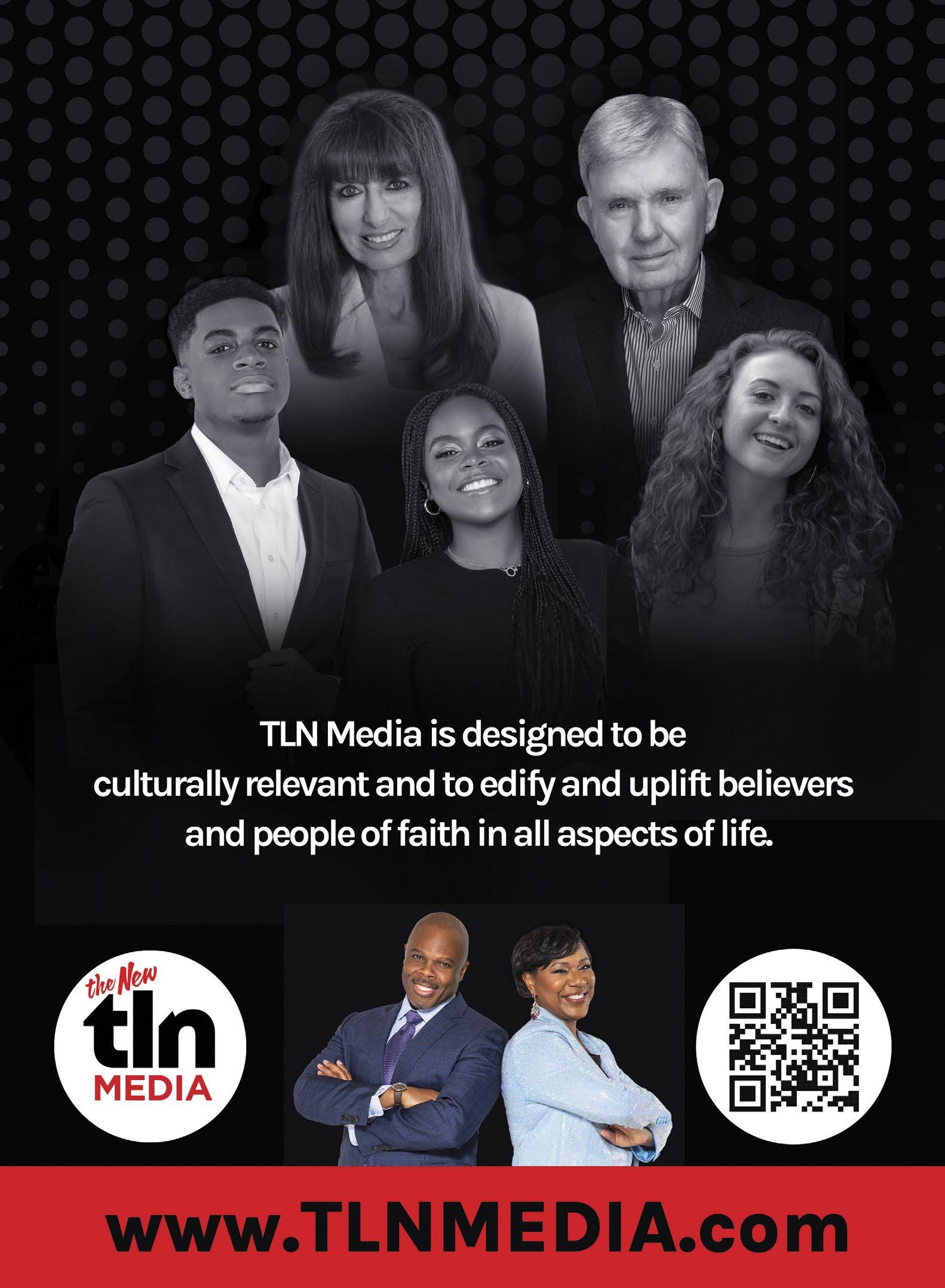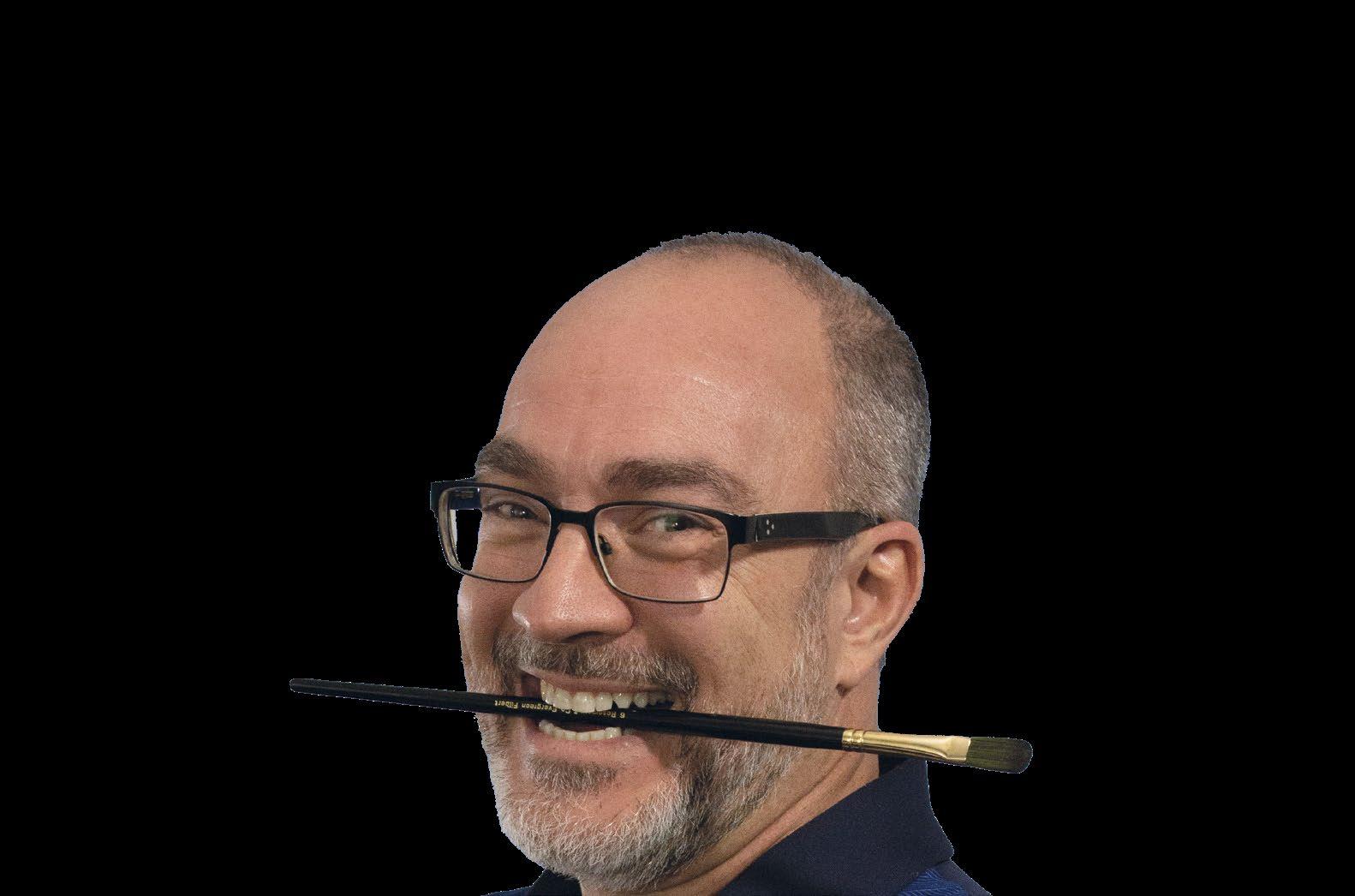

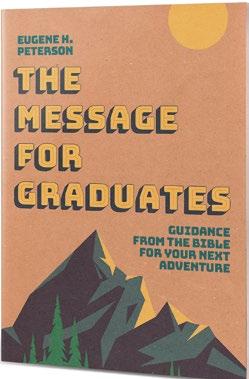
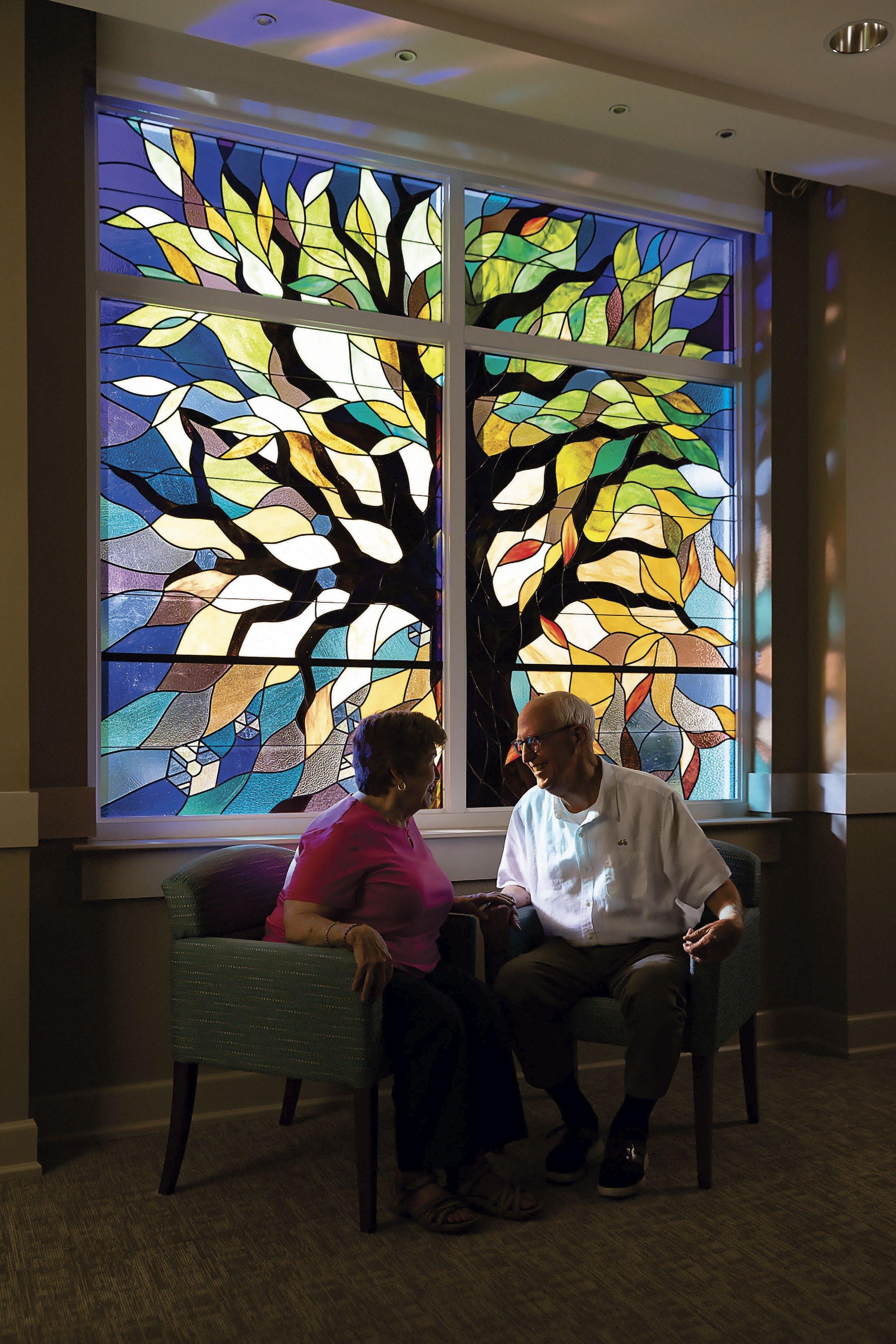

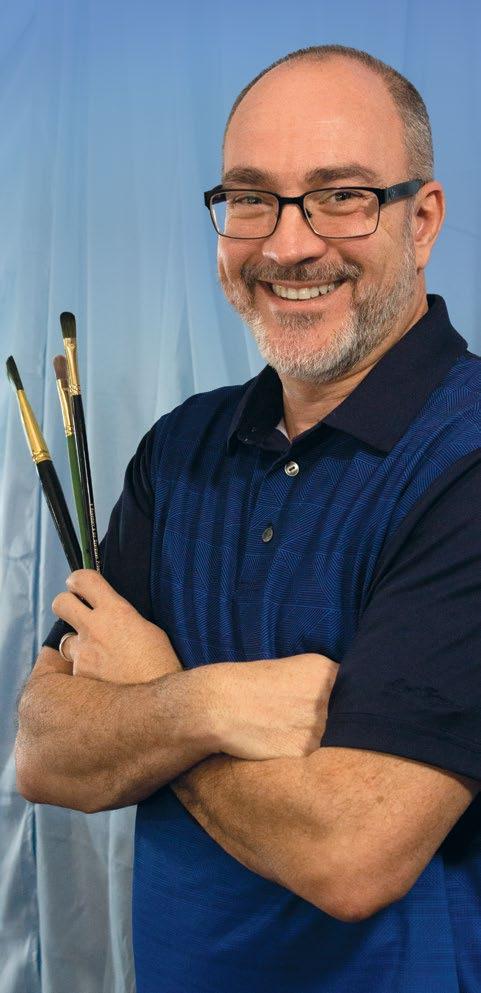
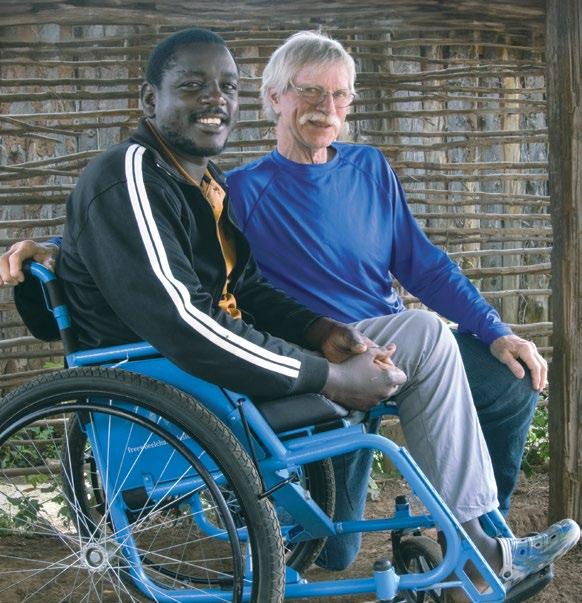
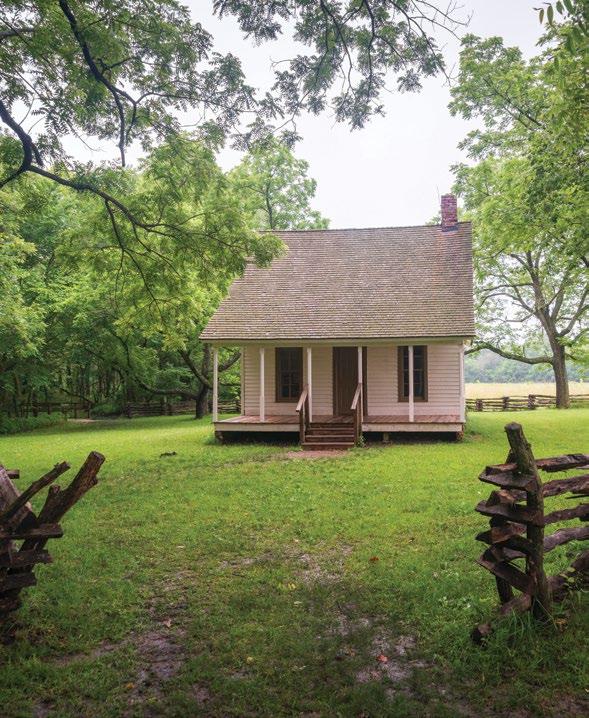









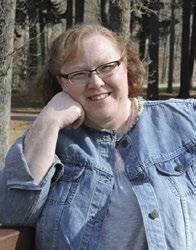
In a world full of darkness and deception, God’s light is still shining. His light still exposes the innate wickedness of our human hearts and the evil deeds done in the cover of night. His light still illuminates the path to eternal life.
God’s light is found in His holy, inerrant word, the Bible. The truths in its pages point to the Light of the World, Jesus, who promised, “he who follows Me will not walk in darkness, but will have the Light of life.” — John 8:12
What a marvelous promise! 1 John 1:7 goes on to say, “But if we walk in the light, as He Himself is in the light, we have fellowship with one another, and the blood of Jesus His Son cleanses us from all sin.” That same soul-saving light, found in God’s people by the power of the Holy Spirit, is a beacon of hope to those still walking in the darkness of this world. Jesus said, in Matthew 5:14, “You are the light of the world. A city set on a hill cannot be hidden.”
It’s quite a challenge for us to let our lights shine before others so they can see our good works and glorify, not us, but our Father in heaven. It requires us to commit ourselves to living holy lives, wholly committed to honoring God in all that we do — even honoring Him in the way we respond to our trials, tribulations and failings.

In this issue, you’ll hear the stories of people who decided to follow the Light of Life, then brought the Light of Life to others. God is at work even in this secular, humanistic age. Satan’s underhanded schemes will never win the victory over the mighty God we serve. The gates of hell will not prevail over the church. The darkness will never overcome the light. We can shine confidently because we are secure in our Savior.
“The Lord is my light and my salvation: Whom shall I fear?
The Lord is the defense of my life; Whom shall I dread.”
— Psalm 27:1
Our Annual Writing Contest is now open for submissions. I hope you will send us your story about your spiritual hero! You’ll find all the details on page 11 and on our website: www.todayschristianliving.org.
In Christ,
Michelle Adserias, Editor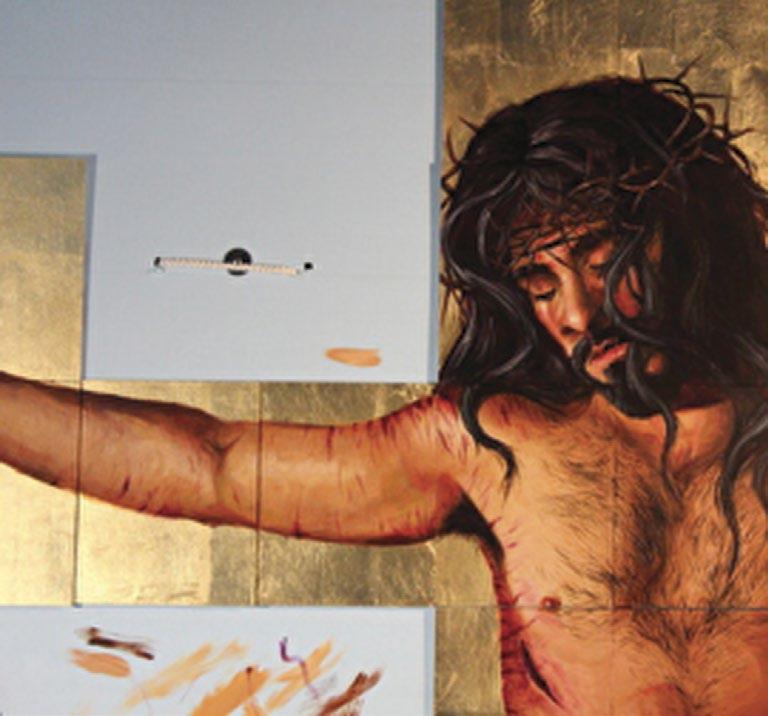

He’s always been an artist. Tim Gagnon was always doodling and drawing. Even as a young man, he developed a reputation as the artist in his hometown of Berlin, New Hampshire. On some level, he knew art could glorify God but didn’t fully understand how until he joined the Air Force as a graphic specialist (graphic designer).
At the time, computer graphics were in their infancy, so graphic design was done by hand. His flight commander, Captain Mark Hayes, who recognized Tim’s talent and burgeoning faith, began discipling him. While serving at Tyndall AFB, Captain Hayes first taught Tim certain Bible passages, then asked him to create biblically accurate illustrations related to the text. The captain used them for Sunday school lessons. Through this subtle approach, Hayes taught Tim while helping him use his skills to God’s glory. “I fell in love with the Word of God. It has been a love affair I don’t think will ever end.”
While he was in the service, Tim was introduced to Florida’s sunny, sandy beaches. When his initial four years were up, the Air Force asked him to re-enlist and go to Germany. He had one question. “Are there beaches in Germany?” The answer was a resounding “no.” Tim left the military and stayed in Florida where he opened an air brush shop in Panama City Beach and worked for the next six years.
When he was 28 years old, he went to college and earned his first degree, in theology. He used his biblical training and his art skills to teach at churches and retreats. After several years of ministry he decided, “I could use a little more credibility than ‘art guy.’” So, Tim returned to school to complete his Master of Fine Arts degree.
“Most pastors don’t understand the role visual arts play in church,” Tim said. He finds the prevailing approach is “I love you, brother, but I don’t know what to do with you.” Thankfully, Pastor Haywood Miller did know what to do with Tim. Pastor Miller asked Tim to paint live during the church’s annual Fresh Fire Worship Conference. Each night, Tim painted inspired works while the attendees sang and praised God. For their tenth anniversary, Tim lit his brushes on fire while painting, to make it more exciting. That was the beginning of a new ministry approach.
Tim now brings his performance art, or speed painting, to churches and conferences across the country. He breathes fire and paints with fire for anywhere from one minute to 45 minutes. He typically paints with acrylics on canvas. When asked what role the fire plays, Tim responded, “The fire doesn’t do anything. It’s just really awesome.” He isn’t wrong! The fire adds an

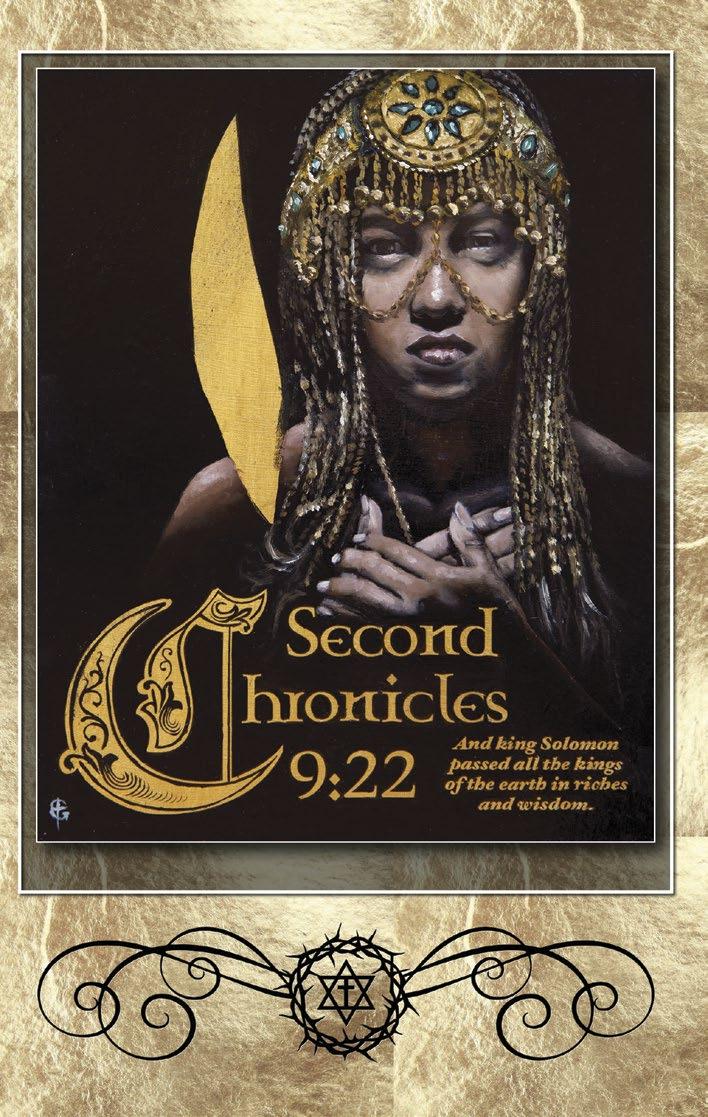
exciting element to an already engaging demonstration of God’s gifting.
God didn’t stop there.
Tim explained artists often have flashes — mental images of things they need to create. He can’t rest until his ideas are expressed. So, when he had an epiphany of the huge undertaking tied to his current ministry, Tim had to pursue it — out of obedience to God’s calling and his God-given artistic gift.
Before Johannes Gutenberg invented the printing press in 1440, Biblical manuscripts were hand-written, usually by monks. The texts were “illuminated,” brought to life with illustrations and ornate lettering in brilliant colors produced with natural dyes, crushed stones and gold leaf. Since the printing press was introduced, only three or four illuminated Bibles have been produced, which makes Tim Gagnon’s endeavor a true treasure.
In his mind’s eye, Tim saw a large crucifix made from a collection of smaller images, a polyptych. 66 8"x10" paintings, one for each book of the Bible, would meld together to form a 12'x9' cross. Because Tim “nerds out” about all the prophetic Old Testament passages pointing to Christ as the Messiah, and all the New Testament fulfillments of those prophecies, each smaller painting features art and Scripture about the promised Lamb of God, who would make the way for all who believed to be saved. “The Bible is one giant story about man’s desperate need for a Savior, and that Savior was called the Messiah.”
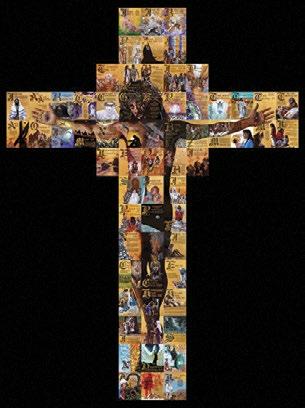
Tim began by building the 12-foot-tall cross. Then he hired a model and painted Jesus on the cross. Once he had the larger image completed, he broke it down into smaller pieces. Tim purchased 100 aluminum panels which he gilded before creating an underpainting in acrylic. Next, he added the calligraphy using a digital acrylic transfer. If anything went wrong during this transfer, the entire painting would be destroyed and he would have to start over. He redid some of the panels seven to eight times.
Finally, he completed the narrative painting in oils. Each image blended into the larger picture of Christ on the cross, which proved challenging. For example, the Queen of Sheba’s face, which is on the illuminated text from 2 Chronicles, is also Christ’s kneecap. It took Tim five years, and all 100 aluminum plates, to complete this 66-panel project — a testament to his “dog with a bone” tenacity and devotion to God’s calling. “If there was no text involved, if there was no theology involved, it wouldn’t have taken that long.” All these illustrated texts have now been published in the high-quality Illuminated Messiah Bible.
Individual paintings, such as First Chronicles 5:2 and Second Chronicles 9:22, comprise the Illunimated Messiah composite shown in inset photo, above.

Though he didn’t realize it at the time, one early influence on Tim’s passion for art was St. Anne Church — the Catholic church he sometimes attended with his grandparents as a child. It would look right at home in Europe with its impressive architecture and grand interior, including a hand-carved ceiling with scenes from the book of Daniel.
For the first 1500 years of church history, the primary tool used to communicate God’s truth and influence culture was visual art. Early Christians understood, from their ties to Judaism, creating fine art was an act of worship which connects the artist to the Creator in powerful ways. Tim explains, “Art that glorifies God is a very old tradition going all the way back to the Babylonian captivity.” At that time, rabbis were mulling over the exact meaning of “I will exalt Him” in Exodus 15:2. They proposed the actual meaning of this phrase was, “I will exalt Him by creating beautiful things.” Certainly, our creativity is evidence of God’s own creative bent.
Tim Gagnon’s passion for art goes beyond creating it. He teaches art as an adjunct professor at Gulf Coast State College and offers fine art classes and apprenticeships through the Gagnon Atelier. You can learn more about available classes at www.gagnonatelier.com and choose “Art Classes.”
If you would like to invite Tim to minister at your church or event with fire painting and an art exhibit, you can contact him at the same website by choosing “Contact.” Because the size of the display makes overthe-road travel the only option, please book your event at least six weeks in advance.
The Illuminated Messiah Bible (Broadstreet Publications) is available on Amazon.
“I don’t paint for God, I paint with God.”
While studying art history, and later church history, Tim noticed parallels between the two.
Before the Renaissance, society was largely influenced by Greco-Roman philosophies which touted, “be the best you can be.” Stories of gods and goddesses were themes in many early artworks. But Greco-Roman ideologies had some serious shortcomings. Morality was open to broad interpretation.
The Renaissance gave people the reason and meaning to “be the best you can be.” Because we were created in God’s image, it is our moral duty to live in a manner that reflects our Creator and honors His name. Great artists created masterpieces with biblical themes; works like Michelangelo’s “Pietá” and Leonardo de Vinci’s “The Last Supper.” People traveled hundreds of miles, often on foot, to see the Sistine Chapel.
Churches and cathedrals of the era were designed and built to God’s glory. They were furnished with stained glass windows and fine art designed, first and foremost, to glorify God. While it’s true art helped communicate God’s word to the illiterate masses, that was an ordained outcome, not the initial goal.
When the Protestant Reformation brought new life and light into the church, it had one unintended consequence. The church and the art world went through what Tim called “a nasty divorce.” Concerned with avoiding idolatry, the reformers restricted artists to simple themes and images. Dismayed by the Catholic church’s corruption and the reformation’s censorship, artists pursued secular outlets. We still see the fruit of that fallout today.
Tim would like to help bridge the divide between the church and the arts — one reason he takes his ministry on the road. Tim does his fire painting for churches and conferences. But he does far more. Along with the 12-foot cross and his art supplies, Tim brings the original 66 paintings used in his polyptych. The venue is transformed into an art gallery where people can gain new insights into Christ as our Messiah through visual art. “Imagine what would happen if the greatest art in your city was not inside the museum, but inside your church building.”
Fine art can touch a place in the soul words can’t reach. Tim sees people deeply moved by his paintings. He sees the light of new understanding, of illumination, on their faces. A good friend of his, Marty, brought his mother to Tim’s first exhibit. She stood in front of the huge cross, weeping. She was overwhelmed by the powerful image of Christ’s great loss on the cross, and our great gain.
His art is doing what Tim hoped it would do — allowing others to contemplate Christ through the outcome of his own devotional journey. “I don’t paint for God, I paint with God.”
Creating something tangible to breathe life into the written word makes perfect sense. God gave us His written word but
He also gave us a tangible expression of it. When the time was right, He sent Jesus as the living and breathing Word.
“And the Word became flesh, and dwelt among us; and we saw His glory, glory as of the only begotten of the Father, full of grace and truth.”
— John 1:14

Then our Father sent us to be the living, breathing expression of His word to a dying world. Ephesians 2:10 (Tim’s favorite verse) says, “For we are His workmanship, created in Christ Jesus for good works, which God prepared beforehand so that we would walk in them.” Tim explained the word translated “workmanship” literally means “poetry” and can also be understood to mean “masterpiece.”
A masterpiece is an artist’s defining work. It’s the pinnacle of his creative pursuits. When God looks at us, with all our shortcomings and imperfections, He sees His greatest achievement through Christ, our Messiah. Walking the unique path He laid out for each of us is our greatest calling.
When Tim isn’t busy creating, displaying, or teaching art, he serves on the board of directors for the Patriot Art Foundation. Founded by Mary White, a worldrenowned water colorist and portrait artist, the organization’s aim is to help veterans who are interested in using art to express themselves and connect with others. Art helps those who’ve been traumatized put their experiences into images. Sometimes, their memories are too raw for words. Art can help them unlock deeply-buried thoughts and emotions.
Individuals can sign up for online drawing and watercolor classes. The Patriot Art Foundation provides all the art supplies, free of charge. Those who join a class will have opportunities to interact with and get feedback from artists through a special Facebook page dedicated to participants.
Those attached to a VA hospital can make arrangements for in-person classes with an artist. Again, all the supplies are provided free of charge.
If you or someone you know would like to take advantage of this wonderful opportunity, you can learn more at www.patriotartfoundation.org.

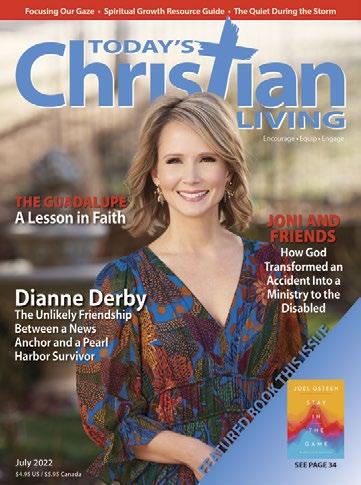
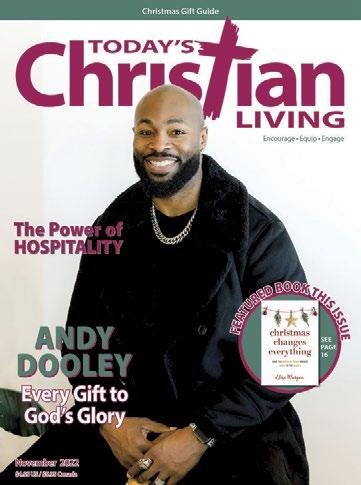
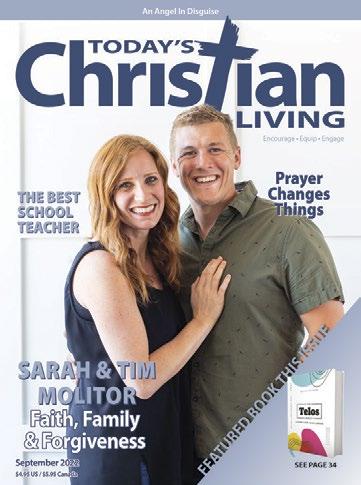
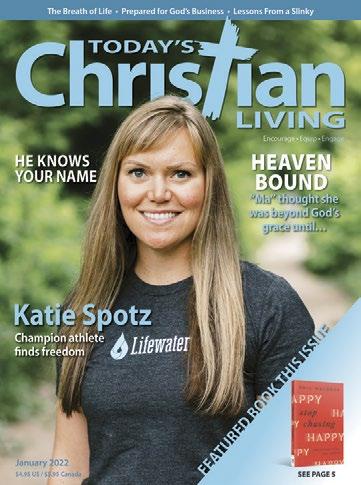
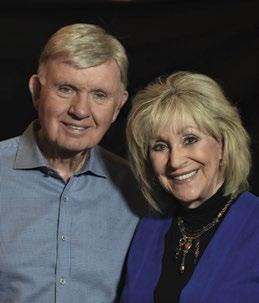
Jerry Rose is an internationally known Christian broadcaster and is former president/ CEO of the Total Living Network. He currently serves as TLN’s chairman of the board and hosts the Emmy awardwinning program
Significant Living. Jerry is an ordained minister and the author of five books, including Deep Faith for Dark Valleys and Significant Living, coauthored with his wife, Shirley. He is the past president of the National Religious Broadcasters and currently serves on its board of directors. Jerry is an avid golfer, equestrian, photographer, and grandfather of 20.
Shirley Rose has been in ministry with her husband, Jerry, for more than 30 years. Her career in Christian television focused on hosting several programs, including the Emmy Award-winning women’s program Aspiring Women. She has authored five books, including The Eve Factor, A Wise Woman Once Said…, and Significant Living, and has contributed to numerous anthologies and periodicals. She is actively pursuing her calling to help other women through writing, speaking, and hosting women’s groups in her home. Her favorite pastimes are country line dancing, travel, and spending time with her 20 grandchildren.
My wife Shirley was not raised in a Christian home. However, she accepted Christ at eight years of age and attended church due to the efforts of one family. They picked Shirley and her sister up for church every week for Sunday morning and evening services, Wednesdays and for every other church activity. Their faithfulness continued for ten years, allowing Shirley and her sister to learn the Bible and grow spiritually.
Though her parents showed no interest in spiritual things, Shirley knew her paternal grandparents were Christians. Her grandfather, who was killed in an auto accident before she was born, had been a minister. However, it wasn’t until years later that Shirley learned of her rich, spiritual inheritance. She met an elderly minister, Reverend Cook, who told her he had known the Rider family well. Shirley was delighted and intrigued. She asked Reverend Cook if he had any information about her grandad. He agreed to send what he still had.
Two weeks later Shirley received a large, fat envelope—a treasure trove of Rider family history. It included sermons, newspaper clippings with photos, and minutes of denominational meetings where Rev. Rider had presided. She learned her grandfather served as his denomination’s head for Mississippi. It even mentioned Shirley’s father, who had played his fiddle during services. But the most meaningful document was a yellow, dogeared essay written by her grandmother entitled “The Testimony of Sister E.C. Rider.” It told how Shirley’s grandparents found Christ in 1916. After a call to ministry, they sold all their possessions and lived by faith. She shared about God’s miraculous provision and protection, and how they devoured God’s word, even though their copy had a considerable portion missing.
Learning about her spiritual heritage was beyond emotional. The Christian family my wife had longed for was there all along, in her recent past. It meant everything. It’s very likely her grandparents’ prayers landed Shirley and her sister in that Bible-based church. It’s likely their prayers resulted not only in Shirley’s salvation but her mother, father and all her dad’s siblings eventually coming to Christ.
Legacy can be an inheritance of money, houses, and sentimental items. But the most important legacy you can leave is your faith in God and His Son, Jesus. A legacy of faith and God’s faithfulness is far more valuable than material possessions and must include your story. Our kids and grandkids loved to hear our
stories when they were little. They still do. Perhaps you would like to create a spiritual legacy for your offspring, but don’t know how to begin.
In our book, Significant Living*, Pastor John Coulombe says our legacy includes more than our experiences. It also includes other important things; our traditions, our faith, our values, and the wisdom life has taught us. Sharing your legacy is crucial enough to make it intentional. Here are some suggestions.
Write an oral history. Or better yet, produce a voice recording or video. Your life experiences, in your own voice, offer a personal touch that is especially meaningful.
Start giving away stuff. We have already started. I’m passing on my miniature western saddles to my granddaughters who love horses. Shirley had a skilled seamstress make four bride-doll dresses from her original wedding gown. She gave the dolls to our granddaughters with a framed picture of herself wearing the dress.
Pass on your family traditions. We had a special Christmas Eve tradition. Jerry would read the Christmas story, have prayer, and then let the kids open one gift. We never knew the kids enjoyed this (except getting the jump on opening presents). One Christmas our son Jeff, a minister and artist, gifted us a remarkable copy of the Christmas story from Luke which he had painstakingly created in calligraphy on papyrus. He said one of his fondest memories was my reading the Christmas story every year.
You may not think you have much of a story or that your kids would value it. You may be right. But remember, your life and legacy can touch those outside your family, too, for generations to come.
A recent sermon about Daniel’s life brought this poignantly home to me. From age 15 to 82, he influenced three kings of Babylon profoundly. He stood true to his faith under impossible circumstances, facing death many times, including a den of lions. However, 18 generations later when wise men from the East saw the star and followed it to Bethlehem, they were looking for the Jewish Messiah. Have you wondered how these men from a pagan, ungodly country even knew about the promised Messiah? It had to be through the legacy of Daniel.
Never underestimate the power of your spiritual legacy.
*Significant Living: A Road Map for the Second Half of Your Life was published by Whitaker House and is available through Amazon.
One day God was looking down at Earth and saw all of the rascally behavior going on.
So, He called one of His angels and sent the angel to Earth for a time. When he returned, he told God,
“Yes, it is bad on Earth; 95% are misbehaving and only 5% are not.”
God thought for a moment and said, “Maybe I had better send down a second angel to get another opinion.” So God called another angel and sent him to Earth for a time.
When the angel returned, he went to God and said, “Yes, it’s true. The Earth is in decline; 95% are misbehaving, but 5% are being good.”
God was not pleased. So He decided to email the 5% who were good to encourage them and give them a little something to help them keep going.
Do you know what the email said?
Okay, I was just wondering, because I didn’t get one either.
— From Mikey’s Funnies www.mikeysfunnies.com

“What’s that, girl… Jonah is trapped in a whale!?”
If you have a joke or funny story you’d like to share, email editor@todayschristianliving.org
If we print your joke, we’ll pay you $25.

“I think we’ll just take an Uber.”
Did you know that there are an estimated eighty million people in this world who need wheelchairs? If you did, it might be because you have heard of Don Schoendorfer of Free Wheelchair Mission.
In 1979, while on vacation in Morocco, Don witnessed the heartbreaking efforts of a woman with a disability struggling to drag herself across a busy street. It was an image that would not only remain etched in his mind, but eventually lead Don to make it his mission to bring mobility to those in need.
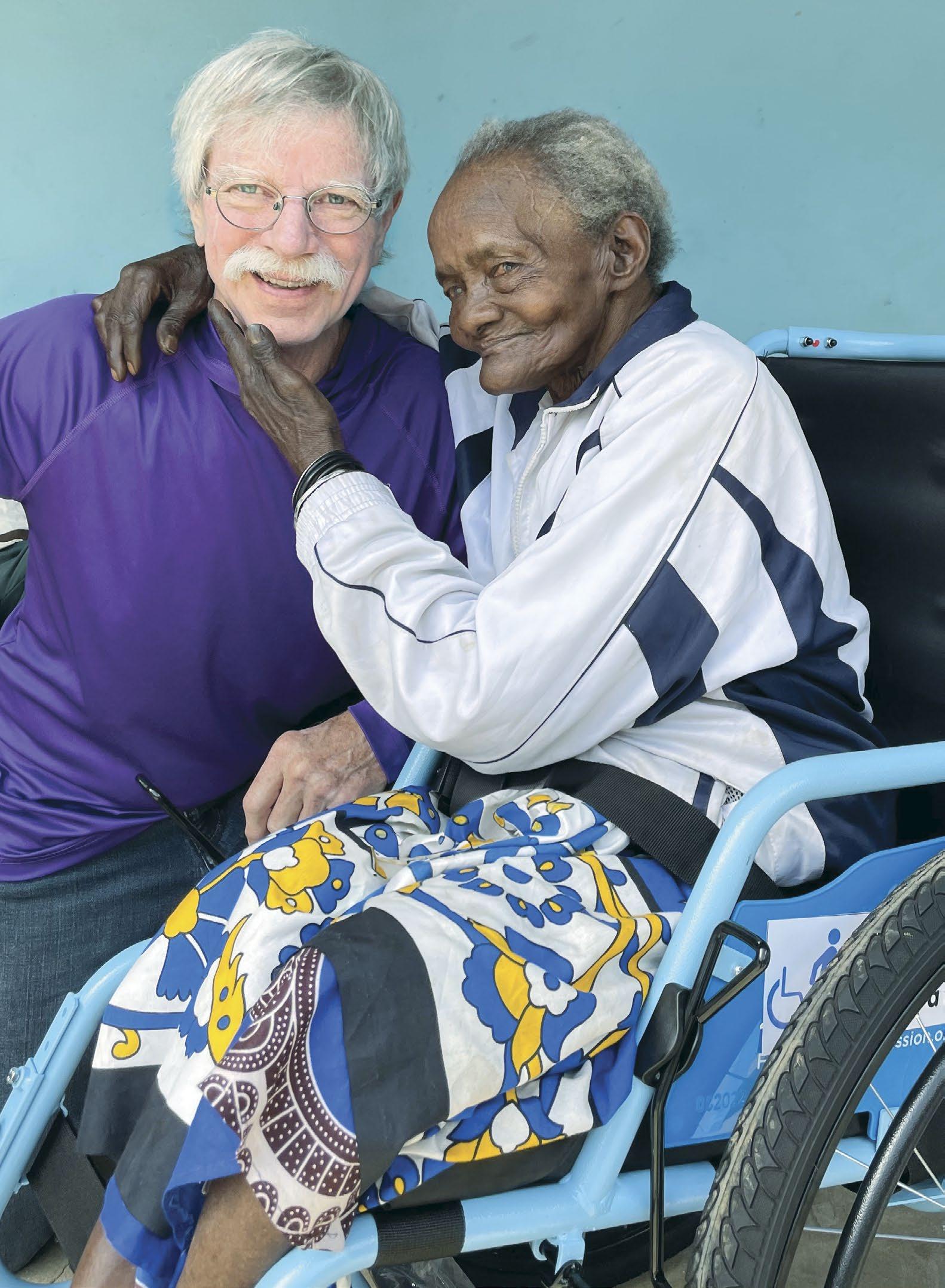
Don recalls growing up in Ashtabula, Ohio, where he was often found speeding up and down the side streets on his homemade go-kart. It was nothing fancy, Don recalls, “it was more of a souped-up tricycle running off a lawn mower engine, but it was fast and agile.” That’s what was important to a tenyear-old who occasionally needed that speed and agility to evade the local patrol cars.
Don said, “My dad was a machinist for New York Central railroads. He oversaw the blueprinting, designing, and manufacturing of intricate pieces of machinery. So, there was never a shortage of wrenches, screwdrivers, and tools at our disposal. This meant I was always tinkering, taking things apart, and hopefully putting them back together again.”
Over time Don’s go-kart was in desperate need of an upgrade. His Dad would often say, “Don’t tell me what you need, draw me a picture. This forced me to explain things through drawings, which was good for me since it was harder for me to communicate with words.” Don’s beloved go-kart went through endless trials, like the muffler experiment to make his go-kart louder and the conversion from three wheels to the greater stability of four. With each modification and unique upgrade, Don created a blueprint for his father to machine the necessary parts. Those blueprints had to be 100% accurate or it was back to the drawing board.
Don’s two older brothers became engineers. Because of the family’s modest income, Don realized if he wanted to go to college, “I needed to turn a corner, hunker down, study harder, and get my grades in shape because, academically, I was just getting by. I also needed to save money for my tuition fees, because my parents wouldn’t have anything left after my brothers’ college expenses were paid.”
The weekly highlight for the Schoendorfer family was the trip into town for the Sunday edition of the New York Times The paper fostered many lively conversations about current events. Even the opinion pieces were known to spark some friendly banter. Don remembers finding an article about MIT (Massachusetts Institute of Technology) in one issue. The writer claimed it was the best engineering school in the world. “I now had a purpose, a destiny, and a dream.”
Determination fueled Don during his undergraduate years. His dream to go to MIT evolved into achieving his PhD from the world-renowned university. “This would give me the chance to gain some kind of freedom. Freedom to be independent, to avoid a life of working on an assembly line. I didn’t want to take orders from anybody. I wanted to be the visionary, the one who figured out the mechanics, and put together the pieces of the jigsaw puzzle. I wanted to do something good for the world, maybe even something great.”
Not only did MIT accept Don into the Biomedical Engineering PhD program, they offered him a full scholarship. “Every bit of my education was covered.” Dreams do come true.
“
When we provide a wheelchair, we want the individual to feel as if they are being cradled in God’s hands.”
— Don Schoendorfer
While at MIT, Don proved his thesis of synthesizing artificial speech for those who lost the use of their vocal cords. He went on to create the prototype of a vibrating reed that could be surgically implanted at the base of the vocal track and allow people to speak again. The MIT PhD committee was so impressed with Don’s work, they wanted to patent it. This was the first of a long list of patents, sixty to be exact, Don would help create.
Married with children, Don was building a life with his wife, Laurie, in California. They sought the best for their daughters; the best schools, the best extracurricular activities and the best opportunities. But not everything was within their control. Their eldest daughter had an eating disorder, and life got difficult, quickly. Their attempts to help their daughter failed so she went to a treatment center in Phoenix. This became a turning point in their daughter’s life — and in Don and Laurie’s lives.
Church was the only off-campus location approved by the treatment center for visits. One Sunday when they were visiting, the family met their daughter at church. Their daughter introduced them to the pastor when the service was over. After some awkward small talk, Don asked, “Are there any churches in Orange County like yours?” The pastor answered, “Mariners Church is pretty similar to what we do here.”
It didn’t take Don long after he started attending Mariners Church to be brought to the place of total surrender. He gave the Lord the things he could not fix and let go of his list of things he wanted to accomplish. After one particular sermon, he realized accomplishment in the world’s eyes was a fool’s game. There would always be one more thing to do. He knew something needed to change.
Don volunteered with Mariners inner city learning programs for a while, but felt like the Lord spoke to him saying, “You’re not using the tools I gave you. Can’t you come up with something that would help my kingdom?” Don kept replaying this conversation with God over and over in his mind. Then he remembered the woman dragging her body across the cobblestone street in Africa. He thought, “How many people could be lifted off the ground if only they had a wheelchair?”
Don did loads of research. He knew this wheelchair had to be durable, lightweight, easy to produce, and affordable to transport. One question haunted his design, “What’s the least expensive, most durable chair in the world?” The answer came
to him, “the white resin lawn chair.” Months of tinkering led to the first prototype and as Don looked at it, even in its simple form, he thought, “I finally created something significant, something that just might help people.”
During a Sunday service at Mariners, Don’s wife Laurie noted the church was planning a medical mission trip to India. She said to Don, “You should go and see if you can give away some of your wheelchairs.” Don had built one-hundred wheelchairs since his first prototype. He’d gone back to the drawing board again and again, always improving his design, and all those wheelchairs were living in the Schoendorfer’s garage. Don apprehensively agreed to go. He faced some opposition, even a little criticism, because he wanted to bring along some wheelchairs. Eventually, the team agreed to bring as many wheelchairs as they could manage. Four wheelchairs made it to India.
Don had no idea what to expect. Since he was not a medical professional he was relegated to set up and tear down. Day one of the medical outreach was the most significant day for the entire team, and it was because of one wheelchair.
Don was busy setting up when a family approached carrying their child who had cerebral palsy. Don saw this as an opportunity to give away his first wheelchair and, hopefully, bless this family. The mother immediately put her child in the chair and began rocking it. The family seemed to experience a freedom like never before. When the team had a break, they helped the family transport the wheelchair home. After driving over some rough territory, the harsh reality hit. This family had carried their son three miles across rugged, rural terrain just to see the doctors.
The team was overwhelmed by the poverty they saw in the family’s village and, moments later, they were overrun by the entire town. They helped the family get home and set up their wheelchair before they decided it was time to go. As they began to pull away, the entire village surrounded the van, making it impossible to leave. When the child’s mother realized she was able to keep the wheelchair, she ran up to the van with the only gift her family could afford — two glasses of water.
Every wheelchair given out on that trip changed lives. What Don didn’t expect was how much his wheelchairs were changing him.
Don now had his life’s mission; creating miracles on wheels and bringing mobility to those in need. He saw every wheelchair not only as an opportunity to bring hope and freedom to someone, but also as an opportunity to share God’s love.
Mike Lutz is the author of the award-winning devotionals
Jesus Speaking and Jesus Speaking Devotional Prayers. Mike has been in ministry for over twenty-five years where he has spent time as a Youth Pastor, an Associate Pastor, and a Senior Pastor. Mike is also the author of such books as God Every Day, Discovering God’s Will for Your Life and the end times thriller The Armageddon Initiative. For more information about Mike visit www.MikeLutz.org or his author page on Amazon.
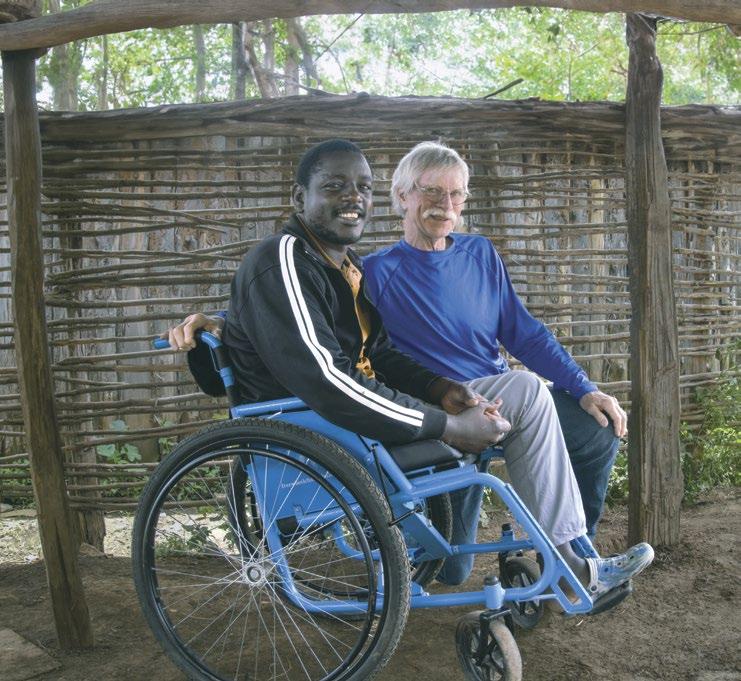
Soon after buying the Nonprofit Kit for Dummies, Free Wheelchair Mission was born. The name said it all, “I wanted to give away wheelchairs for free. There was never a desire to sell them, not even at a discounted price. We would model ourselves after the persona and work of Jesus who always showed compassion and mercy to the world, especially to the poor, the sick, and to those living with disabilities.”
In the first year, Don gave away those first 100 wheelchairs in his garage. Just over a year later, he gave away 24,000 wheelchairs. His garage was no longer big enough for what God was doing.
Don wanted everyone who received a wheelchair to know the following:
Jesus Christ loves you. That’s why you are receiving this wheelchair. We believe that this wheelchair comes from God. He created you, and He loves you as His child, just as you are. As believers in Jesus, we are called upon to serve others. Our prayer is that as you move around, you too will trust in Him, serve Him, and bring glory the His name. God bless you.
To date, Free Wheelchair Mission has given away more than 1.4 million wheelchairs at a cost of $96 each.
If you want to help Don with his mission you can visit www.freewheelchairmission.org and learn more about giving, volunteering, being a fund-raising ambassador or gifting a wheelchair to someone in need. “We would not be able to continue this important mission without the generous support of so many people.” You will also find Don’s book, Miracle Wheels at www.freewheelchairmission.com

We all have teachers, mentors and heroes of the faith that impact our walk with God. In 1200-1500 words, tell us about your spiritual hero (besides Jesus) and why that person is so important to you. What first drew you to your hero? Why do you admire him or her? What have you learned from your hero? You can write about a Bible character, well-known ministry leader, pastor, family member or personal friend.
Please include a short author’s biography and 2-3 photos (if possible) that complement your story. You can find more details about contest submissions at todayschristianliving.org under our Writer’s Guidelines.
1st Prize: $300 and we publish your article
2nd Prize: $200 and we publish your article
3rd Prize: $100 and we publish your article
Submissions must be received by August 15, 2024.
Winners will be announced in the January 2025 issue.
Email submissions to editor@todayschristianliving with Contest Submission in subject line. Or send by mail to: Today’s Christian Living, ATTN: Editor, P.O. Box 5000, Iola, WI 54945
All submissions must be previously unpublished and your own work. If you enter, you are granting us permission to publish your story if you win. All winning submissions become the property of Today’s Christian Living and may be edited to fit the style of the publication.
Aman was accused of murder and brought before a judge. The man admitted his guilt, the jury found him guilty, and the judge pronounced his sentence with deep sorrow: the death penalty.
The guilty man was his own son. Despite the judge’s deep love for him, he could not dismiss the charges or avert the penalty. He must uphold the law or be a corrupt, unjust judge. He was caught in a heart-wrenching dilemma. Then he thought of a solution. The judge stepped down, removed his robe, and exchanged places with his son. He was executed in his son’s place.
That’s what Jesus, in His grace and mercy, did for us when he died on the cross. He was not guilty but paid the penalty for our guilt; he was sinless but paid the price for our sin.
God’s forgiveness is available to anyone who will own, ask forgiveness for, and turn away from their sin (repent) and put their hope, faith, and trust in Christ alone. Only His blood, shed on the cross, can wash away the guilt of our sin so we can forever enjoy God’s forgiveness and fellowship.
The question is, will you accept God’s free gift? It’s only a sincere prayer away. If you’d like to find new life in Christ, tell God you are sorry for your past wrongs and want Him to be your Lord and Savior. He’ll send the Holy Spirit to live in you, guide you, and change you from the inside out.
“It is by grace you have been saved through faith — and this is not through yourselves, it is the gift of God — not of works, so that no one can boast”
—Ephesians 2:8-9


At the Billy Graham Archive and Research Center, researchers and students can listen to unique and rare radio broadcasts as they study his Biblical message and ministry. Come be inspired and equipped for the work of the Gospel.
Learn more about study, research, and training opportunities at BillyGrahamArchiveCenter.org or by calling 704-401-3200
“ Teach these truths to other trustworthy people who will be able to pass them on to others.” —2 Timothy 2:2, NLT

“When you can do the common things of life in an uncommon way, you will command the attention of the world.”
These words by George Washington Carver (1864-1943) were the frame for one of the most influential African Americans in history. It’s likely you’ve heard of Frederick Douglass, Booker T. Washington, and Rosa Parks, but don’t miss the transformative “uncommon way” of George Washington Carver, a man who “commanded the attention of the world.”
Carver was one of America’s greatest botanists, but he was also an educator, conservationist, artist — and dedicated Christian. His story is worth retelling.
George Washington Carver was born into slavery in Missouri, sometime in 1864. He, along with his mother and sister, were kidnapped by slave raiders when he was just a newborn baby. They were transported to Arkansas and later sold in Kentucky. Carver’s Missouri master desperately tried to locate them, but only found George. After some negotiation, the baby Carver was redeemed, rescued, and returned to Missouri. A few years later, when slavery was formally abolished, George’s master chose to become his father, raising him as one of his own.
From an early age, Carver was encouraged to read, write, investigate, and study. His favorite subject was botany. He collected wildflowers and grew them in a secret garden outdoors.
At age 11, Carver moved to Neosho, Missouri to continue his schooling. That’s when he met Mariah Watkins, an African American woman who boarded George and encouraged his education. It was important, she said, that Carver “give …
learning back to [his] people.” And that’s exactly what he did. His drive to learn as much as possible, no matter where it led him, framed his entire life.
George eventually moved to Kansas, where he graduated from high school. He was 30 years old before he could save enough money to attend Simpson College in Indianola, Iowa to study art. Painting fruits and flowers reignited his love for botany. He worked his way through college by opening a laundry where he washed his schoolmate’s clothes.
In 1890, Carver transferred to Iowa State Agricultural College (now Iowa State University) to study agriculture. He was the college’s first African American student and earned his bachelor’s degree in 1894, then his master’s degree in 1896. Carver’s stellar intelligence, positive attitude and impressive agricultural skills landed him a faculty job at Iowa State, where he became the school’s first African American professor.
But it didn’t take long for George Washington Carver to receive a higher call. This one was from Booker T. Washington, the principal of the esteemed Tuskegee Institute in Alabama. Booker offered George a great salary and provided the bachelor with his own two-room campus apartment (with one of the rooms just for his plants). However, Carver’s move to Tuskegee wasn’t easy. His nicer accommodations sparked jealousy among other single instructors, who shared rooms and survived on meager salaries. Furthermore, the transition from “free” Iowa to the Jim Crow South proved difficult for him. Oppression was common during this time, as were violent acts by the Ku Klux Klan. Lynchings, Black vote suppression and segregation were life realities. It was a culture that Carver would have to learn to navigate carefully.
And he did. For the next five decades, Carver taught at Tuskegee.
He developed the agriculture department, taught classes, managed the school’s farms, mentored students, handled janitorial duties, served on multiple committees, and worked with area farmers. Despite his many activities and commitments, Carver was an introvert. He preferred working quietly with his plants to any other activity.
Carver’s greatest contributions involved his work with poor Alabama sharecroppers. He made a mobile classroom, the Jesup wagon, where farmers could learn how to grow crops more effectively. He helped them to better feed their families by teaching them how to rotate crops, fertilize with “swamp muck,” and feed their livestock better (and cheaper). He encouraged them to rotate cotton crops with peanuts, sweet potatoes, and soybeans — plants that infused the soil with nitrogen. This allowed the soil to rest and rejuvenate. He developed over 300 food, commercial and industrial “peanut” products. He discovered that you can make paper, ink, shaving cream, sauces, linoleum and milk out of peanuts. He experimented and found that you can make soap, coffee and starch out of sweet potatoes. He often said, “A weed is a flower growing in the wrong place.” He showed this to be true more than once.
By 1910, Carver was famous for his agricultural science, not just in America, but around the world. He used his celebrity status to promote his love of peanuts, the Tuskegee Institute, and racial reconciliation. Carver also proved to be a prolific writer, penning books, articles, and bulletins. He was friends with U.S. Presidents and captains of industry. He eventually funded a Tuskegee foundation and museum using his own life savings.
In 1914, Carver’s rotation to different crops besides cotton became imperative. The boll weevil started ruining cotton crops in Alabama. Farmers needed money, so they planted peanuts and sweet potatoes instead of cotton. Through the development of peanut flour, coffee, candy, sweet potato paint and medicine, the farmers were able to make a living. Carver was a devout Christian. In fact, many historians credit his humility, gentleness, compassion, and joy to his deep faith. Although he never married, he kept many close friendships from his church. He believed only Christianity could eradicate racism and social disharmony. He was also a Bible scholar and popular Sunday School teacher, known for his ability to act out a Scripture story.
In 1922, Carver provided a student with his “eight cardinal virtues”:
• Be clean both inside and out.
• Neither look up to the rich nor down on the poor.
• Lose, if need be, without squealing.
• Win without bragging.
• Always be considerate of women, children and old people.
• Be too brave to lie.
• Be too generous to cheat.
• Take your share of the world and let other people have theirs.

George W. Carver died January 5, 1943. His Tuskegee gravestone reads: “He could have added fortune to fame, but caring for neither, he found happiness and honor in being helpful to the world.” Carver has been memorialized as one of America’s most important persons. His likeness adorns stamps, coins, and medals. His name appears on schools, bridges, and streets. Carver has state parks and botanical gardens named for him, and his Missouri birthplace is a National Monument. He’s also been elected to multiple “halls of fame” and awarded honorary degrees. Since 1943, January 5 has been George Washington Carver Day.
From slave to world renowned botanist and agricultural scientist, this Tuskegee professor packed a lot of life into his 79 years. George Washington Carver was a great botanist, agricultural scientist, educator, conservationist, inventor, artist and Christian.
SOURCES:
“George Washington Carver” (Wikipedia): https://en.wikipedia.org/wiki/George_Washington_Carver
“George Washington Carver: An Uncommon Life” Documentary (Iowa Public Broadcasting): https://www.youtube.com/watch?v=_3CVmluYFtI
“George Washington Carver” (History.com): A&E Television Networks.
https://www.history.com/topics/black-history/george-washington-carver
Accessed February 17, 2022.
Brandenberg, A. (1988). A Weed is a Flower: The Life of George Washington Carver
New York: Simon & Schuster, 12-19.
Montgomery, H. (2021). What’s in your pocket? discovering treasures in nature.
Waterton, MA: Charlesbridge Publishing, 3, 32.
Proudfil, B. (2023). George Washington Carver and peanut products
New York: Gareth Stevens Publishing, 12, 13, 18.
Michael Shoemaker is a poet, writer, and photographer. He is author of Rocky Mountain Reflections (Poets’ Choice, 2023). Michael is a winner of the California State Poetry Society Prize and is on the shortlist for The Letter Review Prize for Poetry. His writing has appeared in Blue Lake Review, the High Window, The Penwood Review and elsewhere. His poems are anthologized at Poetry Pacific and Pure Slush. He lives in Magna, Utah with his wife and son . Michael has degrees from Brigham Young University and Pacific Lutheran University. He fervently believes in Jesus Christ and is earnestly trying to follow Him.

 By Reno Xavier
By Reno Xavier
Ichose Jesus. It was a leap of faith, as not everything made sense. At age 19, when I took that first step towards Jesus, He began to reveal Himself as the only true way to know God. Major questions in my heart were answered and I felt God speak to me clearly when I read the Bible. Though I feared my parents’ response, I knew Jesus was with me and I needed to trust him for my future. But that’s not where my story begins.
Growing up between two cultures wasn’t easy back in the 70’s. Life was very different for me than for my peers. My parents were Indian Hindus and had an arranged marriage. I was their first child and only daughter. My mum never wanted a girl, so I grew up in the shadow of my two coveted younger brothers. It’s a Hindu custom to get a new baby’s horoscope read. Unfortunately, mine predicted I would be trouble for my parents in the years ahead, which added more disappointment on my arrival.
We lived in a white, working class area in the northwest of England. Life was very mundane. My parents worked hard to provide for us and we were encouraged to pursue our educa-
tion. But I faced bullying at school. I was the only Indian girl in a large primary school. The teachers assumed I wasn’t very bright, and the children mocked me because I was brown.
At home, life wasn’t much better. My father was a hottempered man. I appreciated that he worked very hard to provide for us, but I felt overlooked as he was close to my brothers but distant and cold with me. My relationship with my mum was characterized by scolding, criticism and arguments. My parents placed big responsibilities on my young shoulders. I was left home alone on Saturdays to care for my younger brothers while my parents worked.
My childhood was marked by great loneliness and feelings of inadequacies. No matter how hard I tried I didn’t fit in or feel valued. As a result, I withdrew and lost my confidence. However, I do believe God had His hand on me, even then, and I had deep compassion for others who were hurting or lacking.
Being brought up in a religious family, I had always believed in God. I often knelt before the little temple in our house where all the Hindu idols were kept, to make my plea for help. One major religious experience was travelling to India around my 12th birthday. I vividly remember visiting the various Hindu temples with my family. One particular temple was near the
“ When I am discouraged, God reminds me that I belong to Him.”
Himalayas and involved a day trek. The temple was situated in a cave and access to it was via a tiny entrance. Many myths surrounded this particular Hindu holy place. Apparently, only true pilgrims are able to get in. I remember the eeriness of the place. The Hindu god felt so distant, a deep doubt about Hinduism entered my heart that day. I didn’t understand why a Hindu god would be in a dark cave in the Himalayas, far from people.
My teenage years were a struggle. I never fit in at school and yearned to be like my peers, wearing the fashionable clothes they had and having the same freedom. But I was forbidden to go anywhere apart from school, so my life consisted of housework and homework.
My relationship with my parents was strained, to say the least. We regularly had heated arguments as I tried to assert my independence and voice my frustration with their restrictions. My dad would often lash out in rage and hit me as he tried to train me to be a submissive, dutiful daughter. Resentment and hatred grew in my heart. In the end, I threw myself into my schoolwork and made achieving a place in university my goal, my means of escaping the prison I felt I was living in.
Finally, the day I had worked for arrived. I was dropped off on campus, full of anticipation for the freedom that awaited. But my sheltered life had done nothing to prepare me for life in the real world. I could look after myself practically, but I didn’t have the experience of relating socially, particularly with boys. I did, however, make friends with some Christians and eventually ended up going to church. I enjoyed the various social events they hosted, as the people were friendly and caring.
Looking back, I can see how God’s hand was on my life, preparing my heart to hear about Jesus. I began to question my faith as I observed these Christians who clearly had a deep love for Jesus. I realized I didn’t really know God or have a relationship with Him. In fact, the more I thought about Hinduism, the more confusing and unclear it seemed.
I was challenged with Jesus’s claim, “I am the way, the truth and the life” in John 14:6. This clashed with the strong Hindu belief that all roads, or all religions, lead to God. I had many heated debates with my Christian friends about the bold words of Jesus, but I was still drawn to Him; His peace, His presence and His grace. As I read the Bible, I was touched by how He cared for those who were rejected or undervalued.
For a year I was torn between wanting to find the truth and not wanting to hurt or disgrace my family by turning my back on Hinduism. My parents expected me to have an arranged marriage and be a dutiful daughter, following the Indian tra-
ditions. Months went by as I sat on the fence, undecided and scared of the future. Deep down I knew I needed to make a decision that would affect the direction of my life forever. I needed to take a step of faith and follow Jesus or turn my back on Him and carry on pursuing my family’s Hindu beliefs.
I chose Jesus. My parents were angry and they threatened to take me away from university if I continued attending church.
Many months later I was home for the summer holidays and we were due to visit the local Hindu temple during a major festival. By this time, I had grown in my faith and knew I could not bow to the Hindu idols nor partake in any rituals. I was praying constantly that Jesus would give me the strength to put Him first, no matter the cost or consequence. It was hard because I was in the middle of my studies and desperately wanted to complete my degree to qualify as a teacher.
When we visited the temple, I knew I could not bow to any false gods and refused to do so. My father was so angry, he lashed out at me when we got home and forbade me to go back to university. I went to bed thinking, “What have I done?” A deep wave of peace washed over me as I prayed to Jesus. Miraculously, the next day my father consented to me completing my teaching course by transferring to a nearby school and living with my aunty and uncle.
Jesus was so close to me during those early years as I faced persecution from my family. The Bible was so alive and I drew strength from meeting other Christians secretly on campus. I loved hearing and reading testimonies of how God had worked in ordinary people’s lives. A year later, I made the difficult decision to run away from home as I never truly had freedom to pursue my faith or go to church. Things I longed for then, I now take for granted.
Sadly, my family relationships have broken down. But I live in hope that a day will come when they know Jesus as their Savior and our relationships will be restored. When I am discouraged, God reminds me that I belong to Him. I am His child first and foremost. He is a father to the fatherless.
”Though my father and mother forsake me, the Lord will receive me.“
— Psalms 27:10 NIV
Decades have passed. It’s been a journey of highs and lows. Being a Christian isn’t always easy and surrendering your life to Jesus requires a deep faith and trust. But I have experienced the sweetness of His presence and the tenderness of his touch when things are tough. I know “the way, the truth and the life.” There is only one way to the Father, and it’s Jesus.

Reno Xavier lives in Leicestershire, England with her husband and son where she teaches at a local primary school. She enjoys walking in the countryside and loves spa days. Reno serves in a local church and has a passion for praying.

Walt Larimore, MD, has been called one of America’s best-known family physicians and has been named in the “Guide to America’s Top Family Doctors,” “The Best Doctors in America,” “Who’s Who in Medicine and Healthcare,” and “Who’s Who in America.” He’s a former vice president and physician in residence at Focus on the Family, and the American Life League named him a “Rock-Solid Pro-Life” awardee. He’s also an award-winning medical journalist and the bestselling author of over 40 books. He and his wife of 50 years, Barb, have two adult children and reside in Colorado Springs. You can find his daily blog at www.DrWalt.com and follow him on Facebook at “DrWalt.com.” Have questions for Dr. Walt? Email them to editor@ todayschristianliving.org.
This column is for informational purposes only, does not constitute health or medical advice, and is not intended to substitute for the diagnosis or recommendation(s) of your healthcare professional(s).
By Walt Larimore, MD
Question: What are the pros and cons of coconut oil?
Answer: Coconut oil is obtained from the dried fruit of the coconut palm. Topically, it is a common ingredient in cosmetics, most often used as a fragrance, a moisturizer or a skin and hair conditioner. As a moisturizer, I recommend using a small amount and gently rubbing it directly onto your skin. The Doctor of Pharmacology at NatMed Advisor (formerly known as the Natural Medicines Comprehensive Database — tinyurl. com/34wxpyvf ) have rated topical coconut oil as “possibly effective” for atopic dermatitis or eczema. For dry or frizzy hair, I advise applying a small amount to the scalp and hair for the desired time (a few minutes to overnight) before washing it out.
As to taking coconut oil orally, recently its popularity has soared because of ballyhooed health claims from celebrity endorsers saying it blasts away belly fat, curbs appetites, strengthens the immune system, prevents heart disease and strokes, while fending off dementia and Alzheimer’s disease. With this hype, coconut oil is popular in trending diet fads such as ketogenic and Paleo diets. (tinyurl.com/4numzyc8)
One survey found that 72% of Americans rated coconut oil as “healthy,” though only a small minority of nutrition experts agreed. (tinyurl. com/4hvfe6j8) Why do experts not recommend it?
A review on 21 studies of people taking coconut products oil concluded, “Because of coconut oil’s effects on raising blood cholesterol including harmful [or “lethal”] LDL and in some cases triglycerides, and because its cholesterol-raising
effects were comparable to other saturated fats, the oil should not be viewed as a heart-healthy food and should be limited in the diet.” (tinyurl. com/2d95bcwy)
A review of 16 clinical trials reported coconut oil increased LDL cholesterol levels whereas vegetable oils lowered LDL levels. (tinyurl.com/efembw72)
NatMed Advisor (tinyurl.com/34wxpyvf – subscription) reports there is “insufficient evidence” for taking coconut oil orally for ANY medical condition.
As a result of these data and more, the American Heart Association advises against consuming coconut oil to reduce your risk of heart disease. (tinyurl.com/37hsbef4)
Some coconut oil product manufacturers tout the health benefits of “virgin” or “cold pressed” coconut oil; however, I’m not aware of any proven benefits of either. The bottom line is that coconut oil is rich in harmful saturated fats and high in calories. In general, you should get less than 10% of your daily calories from saturated fats. None is best, but less is better than more.
Question: What’s healthier, butter or margarine?
Answer: This debate has swung back and forth during my career, but as of today, the answer is “it depends.” From the standpoint of preventing or treating heart disease, butter remains on the list of foods to use sparingly, if at all, because it is high in heart-harmful saturated fat. Margarines from outside the U.S. (which are typically high in unhealthy trans fats) and stick margarines (which
are typically high in saturated fat) can be as bad or worse than butter. However, margarines that are low in saturated fat, high in unsaturated fat, and free of trans fats are better than butter. Butter and margarine both have about 100 calories per tablespoon.
But you need to be aware that different margarines can have varying amounts of saturated fat, polyunsaturated fat, and salt. The more solid the margarine, the more saturated fat it has. Stick margarine has more saturated fat than tub, soft, or liquid varieties. To choose a margarine, look on the nutrition facts label for a brand that has the least amount of saturated fat and salt. LiveStrong ® recommends products from Benecol®, I Can’t Believe It’s Not Butter®, and Smart Balance.® (tinyurl. com/35bjsf6n)
Question: Are there any healthy alternatives to butter or margarine?
Answer: For heart and brain health, think phytosterols — naturally occurring, plant-derived substances, including stanols and sterols, produced from nuts, vegetable oils, corn, rice, and other plant foods. They block the absorption of cholesterol and help lower LDL cholesterol without lowering HDL cholesterol. Phytosterol-containing products include spreads such as those from Benecol®, Promise® Activ, Smart Balance®, and many others.
Even though phytosterols are “healthy” fats, they are still high in calories, albeit fewer calories than butter or margarine. For example, Promise ® Activ Light Spread and Smart Balance ® Heart RightTM have 45 calories per tablespoon compared to 100 calories for butter or margarine. Limiting their use will help you control your calorie count each day.
Question: What do you think about stanols or sterols to prevent heart disease?
Answer: The FDA permits sterol-containing products to claim that they help reduce the risk of coronary heart disease (tinyurl.com/3kxz9zw6), although no study has shown a direct reduction in heart disease, heart attacks, strokes, or premature death. Nevertheless, dietary experts advise, “Along with a healthy diet, eating foods that provide you with around 2 grams of plant stanols and sterols every day has been shown to reduce blood cholesterol levels. A healthy diet typically contains only 200-400 mg of sterols and stanols a day. However, this intake is too low to bring about a significant cholesterollowering effect” (tinyurl.com/5yjmjkuh).
Foods fortified with plant stanols and sterols come in many forms such as the healthy-fat-based spreads; juices such as Minute Maid® Premium Heart Wise Orange Juice; and forti-
fied dairy-type foods (milk, yogurt, and yogurt drinks) such as Dairy Farmers HeartActive ® or Yoplait Healthy Heart ® products which typically contain 0.5 to 2 gram of phytosterols per serving size and can help you reach the amount needed to help lower your cholesterol (tinyurl.com/5yjmjkuh). For example, you could have one cup of Minute Maid® Premium Heart Wise Orange Juice at breakfast and one tablespoon of Promise ® Activ Spread on vegetables at dinner, or one tablespoon of Smart Balance Heart Right® spread on oatmeal at breakfast and two Benecol® Soft Chews or CholestOff ® Plus soft gels with dinner.
I always prefer whole foods over supplements, but for those choosing a supplement, they are easy to take (and to take with you) if you need a backup when you cannot reach the 2-3 grams from food sources, for example, when on vacation or when dining out. The experts at ConsumerLab.com® have tested phytosterol supplements and “Approved” as their “Top Pick” Nature Made ® CholestOff ® Plus, which they found “provides the right ingredients at the best price and even has a clinical study to support its efficacy … [and] was by far the least expensive source of sterols/stanols, at just sixteen cents per day. The cost to obtain the same amount of sterols/stanols from other products ranged from forty-seven to seventy-four cents per day” (tinyurl.com/yj53xsts).
For most people, it is not essential to take phytosterols to help manage your cholesterol. Being more active, stopping smoking, and eating an overall heart-healthy diet are far more important. And for many people, a cholesterol-lowering medication is needed. Supplements should not substitute for a healthy diet or prescribed medication but can be used in addition to these steps. Nevertheless, phytosterol supplements are safe to use with a good diet and with a statin drug. If you decide to try one, check with your family physician or pharmacist first. If they okay it, try the phytosterols every day for 6-12 weeks. If your cholesterol levels improve, then it would be wise to continue them.
Unsaturated fats from plant oils have been shown to lower total and LDL cholesterol levels (I call LDL “ Lethal” cholesterol as the Lower the level the better for your health). This is even more true of polyunsaturated fats, such as canola, corn, soybean, or sunflower oil— although no reduction in the risk of heart attacks, strokes, or premature death has been shown. Nevertheless, these products can be part of a heart and brain healthy diet which can raise your level of HDL cholesterol (I call HDL “ Healthy” cholesterol as the Higher the level the better your health).
If you’ve lived for any length of time, you know Heraclitus was right when he observed, “the only constant in life is change.” The season of new life seasons will soon be here. Graduates will be crossing podiums, receiving diplomas and moving their tassels to symbolize the completion of one task and the beginning of another. Whatever they move onto next – a job, an apprenticeship, more formal education –they’ll keep driving forward, never to return to this stage of life.
Moms and Dads will celebrate another year of parenthood. Of course, each passing year means the children are growing and changing, moving toward independence and self-sufficiency. There’s no graduating from parenthood. It’s a lifelong
assignment. But we continually adjust to the changing needs of our kids until it is time to turn them over to God’s care.
As much as I’ve loved every season of my life, I wouldn’t go back to any of them. Would you? Well, it’s a moot point. We can’t go back. But if we look back, we’ll see each had its own trials and tribulations. Each had its own sweetness and rewards. The key to contentment, wherever we find ourselves today, is knowing God is with us, strengthening and keeping us. “… be content with what you have, for He said, ‘I will never leave you nor forsake you.’” — Hebrews 13:5
There are some wonderful, Bible-based resources available to see us through life’s seasons. I hope you find some gift ideas to guide those you love through the coming days.
 By Marian Rizzo and Mario Villella [WordCrafts Press]
By Marian Rizzo and Mario Villella [WordCrafts Press]
Three guys, $300 apiece, 3,000 miles, in one car. What can possibly go wrong? This zany, but heartwarming cross-country journey is inspired by a true story that includes a near-death experience in the Grand Canyon, a wild horseback ride in Nevada, the nurturing of faith, and the bonding of friends. Road Trip is available at Amazon.com and other online retailers.


 By Eugene Peterson [NavPress]
By Eugene Peterson [NavPress]
They’re about to graduate! Give them a timely gift of timeless wisdom. The Message for Graduates weaves God’s Word and the insight of Eugene Peterson into an inspiring and practical resource for students about to start a new chapter of life. You can find it at NavPress.com

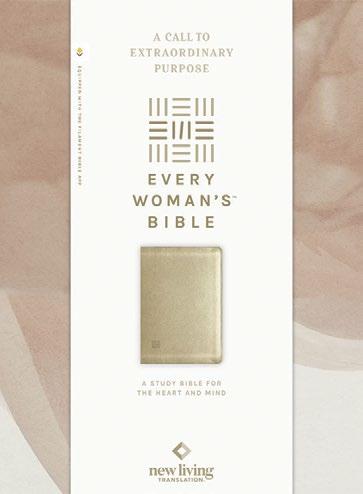
[Tyndale House Publishers]
Every Woman’s Bible is a study Bible for the heart and mind with over one hundred scholars, writers, and contributors—all women—from around the world. It is packed with study notes and devotionals that address topics relevant to women with cultural, historical, and literary clarity and context to gain greater understanding. You can find it at EveryWomansBible.com
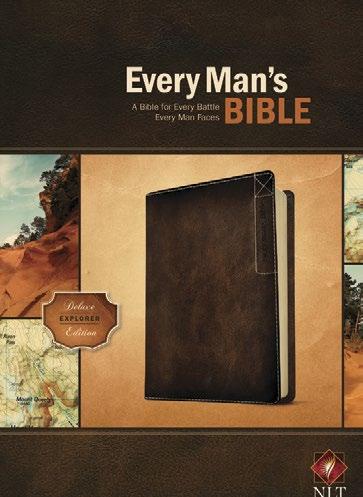
[Tyndale House Publishers]
Every Man’s Bible is designed to help every man develop a fuller, richer relationship with Jesus by understanding what the Bible says about challenges men face. All features were written specifically for men, including thousands of notes, advice from the pros, charts, profiles of men of the Bible, and more. You can find it at EveryMansBible.com
 By Marian Joran Ellis [FaithWords]
By Marian Joran Ellis [FaithWords]
This 30-day devotional helps you see Scripture as a whole. Discover what the Bible is all about, witness an epic tale unfolding, and meet the Divine Author who has been fighting for us through all of history as you embark on a journey from garden to garden—from Eden to eternity. You can find it at https://bit.ly/GardenToGarden
 By Joyce Meyer [FaithWords]
By Joyce Meyer [FaithWords]
Each of us was created to live a life that has distinct purpose and that leaves a unique imprint on the world. Join New York Times bestselling author and beloved Bible teacher Joyce Meyer as she helps us learn how to hear and follow God’s voice when He calls us. You can find it at https://bit.ly/FindingGodsWillBook

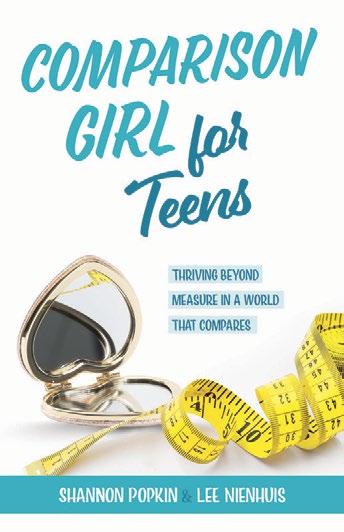 By Shannon Popkin, Lee Nienhuis [Kregel Publications]
By Shannon Popkin, Lee Nienhuis [Kregel Publications]
Best-selling authors Shannon Popkin and Lee Nienhuis have teamed up to show teens how to break free from the comparison trap and embrace the incredible life that Jesus has in store for them. You can find it at https://www.kregel.com/christian-living-anddevotionals/comparison-girl-for-teens/
 By Bob Hostetler [Kregel Publications]
By Bob Hostetler [Kregel Publications]
Parents or grandparents will enjoy reading this sweet bedtime rhyme, filled with dreams and aspirations for their little ones. With amazing, colorful illustrations, this read-to-me story richly shows the love of a faithfilled family with creative scenes that kids will love to see over and over. You can find it at https://www.kregel.com/ childrens-books/i-dream-a-dream-for-you/
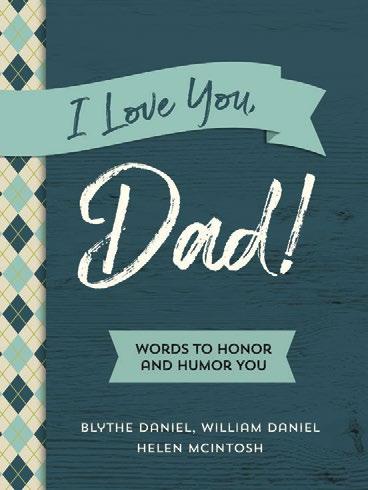 By Blythe Daniel, William Daniel and Helen McIntosh [End Game Press]
By Blythe Daniel, William Daniel and Helen McIntosh [End Game Press]
Dads are worth so much to their family. We want to encourage you and bring you laughter. Even in hard seasons, God chose you to be a father. God has loved you all of your life and extends His hand to you as you have done for your family. Your life matters to your family! You can find it at www.heartconnections.me
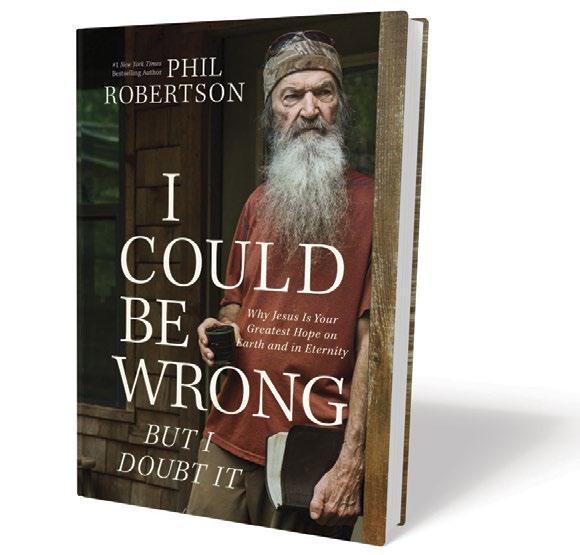 By Phil Robertson [Thomas Nelson]
By Phil Robertson [Thomas Nelson]
Over nearly five decades of walking with God, Duck Dynasty star Phil Robertson has learned a thing or two about why Jesus is the only one worth following. Only Jesus has the answers to our questions and the solutions for our problems. You can find it at https://www.icouldbewrongbutidoubtit.com

 By Cayla Craft [Thomas Nelson]
By Cayla Craft [Thomas Nelson]
Successful entrepreneur and life coach Cayla Craft reveals to readers the seven questions that can unlock a new paradigm for dreaming, envisioning, and activating the life story they want to live. When you learn to use this self-coaching method, you’ll discover the life that God intended you to have. You can find it at craftedoffer.com
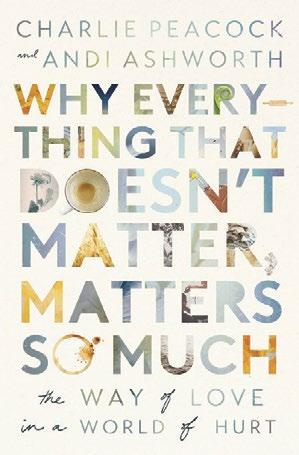 By Charlie Peacock and Andi Ashworth [Thomas Nelson]
By Charlie Peacock and Andi Ashworth [Thomas Nelson]
Dive into the insightful world of Christian culturemaking with Why Everything That Doesn’t Matter, Matters So Much, penned by Grammy winner Charlie Peacock and his wife, Andi Ashworth. Through thoughtprovoking letters, they offer practical guidance and a theology of creativity, inspiring readers to embrace their role in redemptive work. You can find it at everythingthatdoesntmatter.com
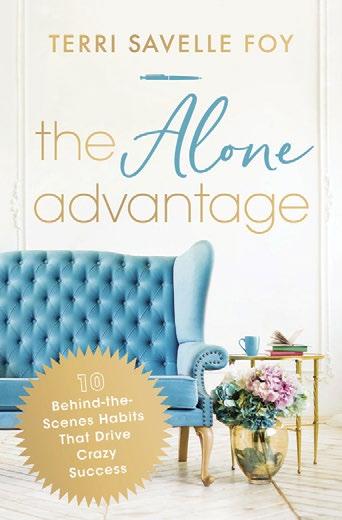 By Terri Savelle Foy [Nelson Books]
By Terri Savelle Foy [Nelson Books]
In The Alone Advantage, Terri Savelle Foy reveals 10 behind-the-scenes habits that not only drive success but reshape every aspect of your life! Get ready to wake up with a new vision, a clear set of goals, and finally claim the dreams God has given you. Learn more at https://nelsonbooks.co/TheAloneAdvantage
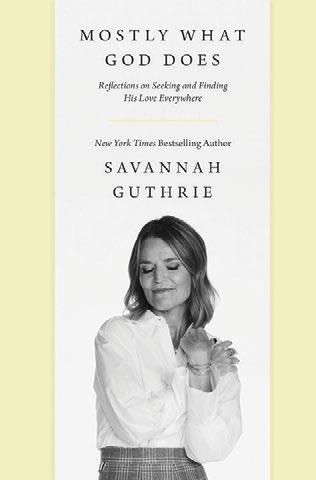 By Savannah Guthrie [HarperCollins] #1 New York Times Bestseller
By Savannah Guthrie [HarperCollins] #1 New York Times Bestseller
Mostly what God does is love you. This deeply personal collection from Savannah Guthrie engages the practical ways that God loves you—not just the world, but you— and to inspire you to venture down a path of faith that is authentic, hopeful, destiny-shaping, and ultimately life-changing. You can find it at mostlywhatgoddoes.com

[Zondervan]

Created to meet the spiritual needs of high school and college students, The NIV Telos Bible is designed to challenge young adults to take a meaningful look at the Bible. It encourages them to follow Jesus while discovering what the Bible says about the subjects that are important to them. You can find it at amazon.com/teenbibles
 By Max Lucado [Thomas Nelson]
By Max Lucado [Thomas Nelson]
Mothers, for so many, are a welcoming hug, a helping hand, a wise source of guidance. They do so much for us, and in the devotional Grace for the Moment for Moms, bestselling author Max Lucado offers moms comfort, encouragement, and some much-needed moments of grace and appreciation. You can find it at Amazon or where books are sold.
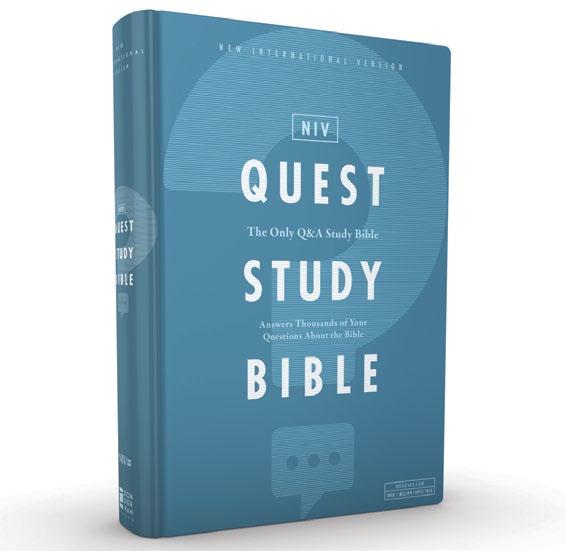
[Zondervan]
One of the best ways to learn is to ask questions as you study. The NIV Quest Study Bible guides you in that endeavor with thousands of questions you want answers to, including the most-asked questions about the Bible. Dive in to finally get the answers you’ve been looking for! You can find it at amazon.com/queststudybible
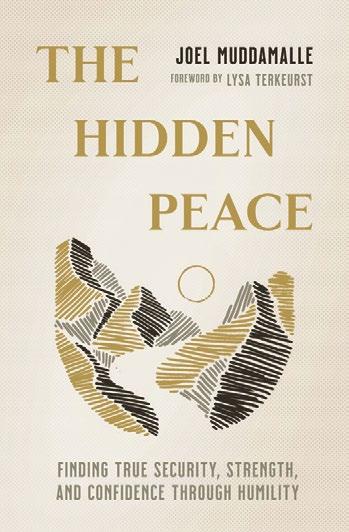 By Dr. Joel Muddamalle [Thomas Nelson]
By Dr. Joel Muddamalle [Thomas Nelson]
New from Dr. Joel Muddamalle! Humility is the missing piece for the security, strength and confidence we all want. It’s time to stop trying so hard to avoid our limitations or overcompensate for them. God has better for us, and it begins with bowing low in humility. You can find it at https://bit.ly/TheHiddenPeace
Rooted: The NIV Bible for Men

[Zondervan]
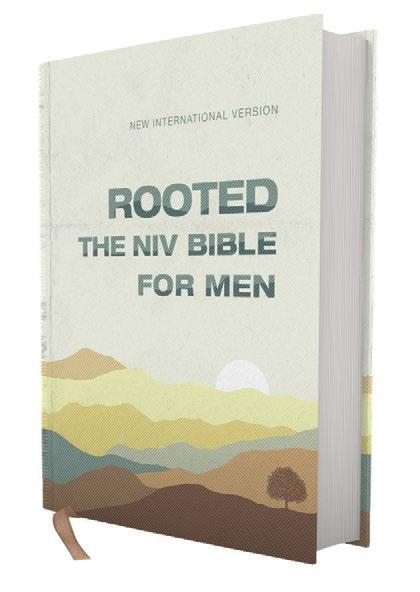
The NIV Bible for Men helps you connect with your identity in Christ as it highlights timeless virtues that are still valued today. It is designed to speak to Christian men honestly and straightforwardly about their role as Christians in the face of cultural pressures and a changing society. You can find it at amazon.com/flourishandrooted
[Zondervan]

Apply God’s Word to your life with a full year’s worth of devotions written by men, for men, along with application statements, questions for reflection, and more. The NIV Men’s Devotional Bible offers encouragement from contemporary and classic communicators and authors that will help you on your walk with God. You can find it at amazon.com/devotionalbibles


[Zondervan]
Featuring over 600 illustrated verses, the NIV Beautiful Word Bible offers a one-of-a-kind visual treatment of Scripture for a more beautiful quiet time. The full-color artwork will bring the message to life, while the wide margins allow you to express your own feelings, fears, and prayers through words or pictures. You can find it at amazon.com/beautifulword
[Zondervan Gift Books]
The Weekly Series is your invitation to pause, breathe, and blossom in your spiritual journey. Each unique 52-week journal offers a fresh biblical theme, encouraging verses, and insightful prompts which are carefully designed to grow your faith and guide you closer to God’s grace and wisdom. You can find it at https://www.zondervan.com/p/the-weekly-habits-project/

[Zondervan]
The NIV Busy Mom’s Bible offers you inspirational reading. Dive in daily or once a week to spend time reading Scripture and applying its lessons to your own life. Over the course of a year, you’ll walk through the entire Bible and find endless encouragement along the way. You can find it at amazon.com/devotionalbibles

[Zondervan]
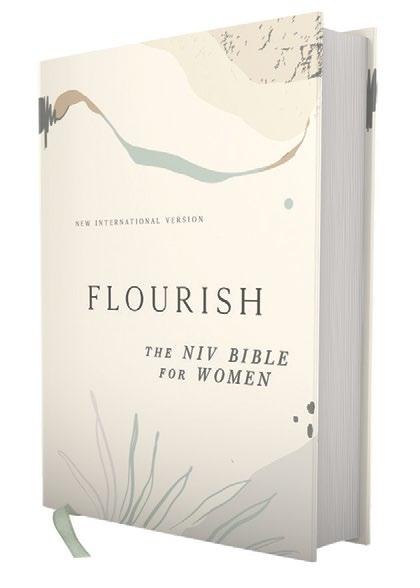
Flourish: The NIV Bible for Women is about becoming who you are in Christ through your relationship with H im. Drawing on the truths of Scripture, the features in this Bible will strengthen you with insights and encouragement for the issues you face. You can find it at amazon.com/flourishandrooted Everyday Snack Tray
 By Frances Largeman-Roth [Revell Books, a division of Baker Publishing Group]
By Frances Largeman-Roth [Revell Books, a division of Baker Publishing Group]
As beautiful and inspiring as it is practical, this is your go-to guide to creating colorful, flavorful, nutritionally diverse, fun boards and trays for every occasion—from a quick bite to an unforgettable holiday celebration. Filled with delicious recipes and ideas developed by registered dietitian nutritionist Frances Largeman-Roth. You can find it at https://bit.ly/EVERYDAY24
[Zondervan]
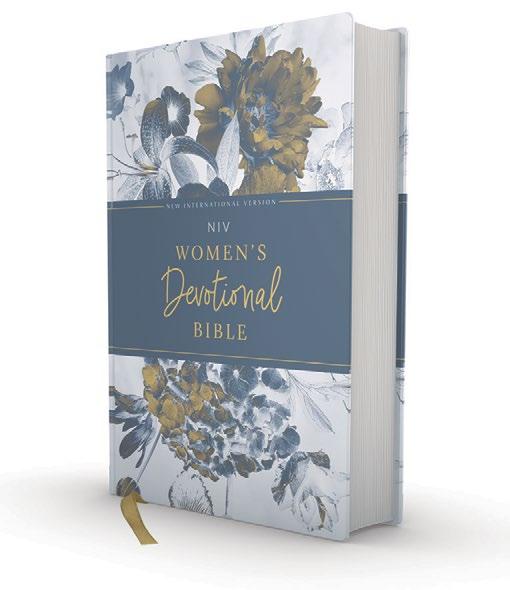
The NIV Women’s Devotional Bible features hundreds of devotions written for a woman just like you. It includes guided reflections to help you apply Scripture to your daily life, and it will allow you to get to know the women of the Bible through candid portrayals. You can find it at amazon.com/devotionalbibles
 By Jonathan “JP” Pokluda [Baker Books, a division of Baker Publishing Group]
By Jonathan “JP” Pokluda [Baker Books, a division of Baker Publishing Group]
Combining entertaining stories, insights from the Bible, and compelling evidence from research, “JP” Pokluda lays out a roadmap for how to navigate life as an adult, addressing topics like
- friendships and dating
- career and finances
- interpersonal conflict

- controlling anxiety
- discovering your purpose on this earth
You can find it at https://bit.ly/ADULTING24
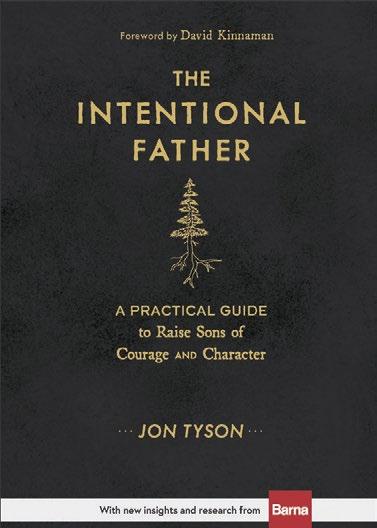 By Jon Tyson [Baker Books, a division of Baker Publishing Group]
By Jon Tyson [Baker Books, a division of Baker Publishing Group]
This concise book is filled with practical steps to help fathers, grandfathers, and other male mentors raise young men who know what they believe, know who they are, and will stand up against the negative cultural trends of our day. You can find it at https://bit.ly/FATHER24
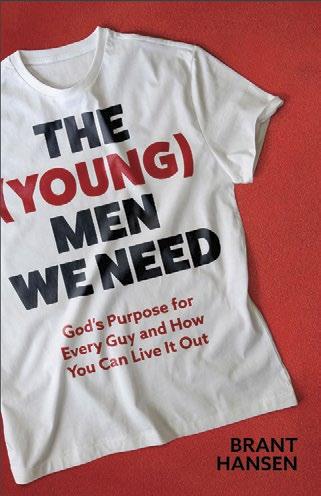 By Brant Hansen [Baker Books, a division of Baker Publishing Group]
By Brant Hansen [Baker Books, a division of Baker Publishing Group]
Combining depth and humor, Brant Hansen calls for young men of all interests and backgrounds to be ambitious about the right things and to see themselves as protectors and defenders of the vulnerable, with whatever resources they have at their disposal. You can find it at https://bit.ly/YOUNGMEN
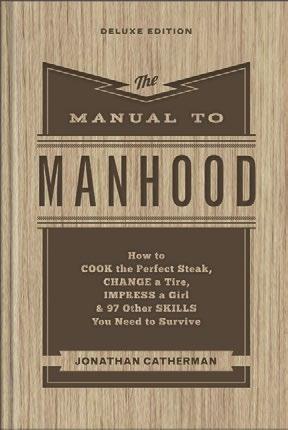 By Jonathan Catherman [Revell Books, a division of Baker Publishing Group]
By Jonathan Catherman [Revell Books, a division of Baker Publishing Group]
This bestselling collection contains one hundred step-bystep instructions on almost everything a guy needs to know. Now in a handsome deluxe edition, young men will learn how to:
- Clean a bathroom
- Wear cologne correctly
- Manage a credit card
- Change a tire
- And much more
You can find it at https://bit.ly/MANUAL24

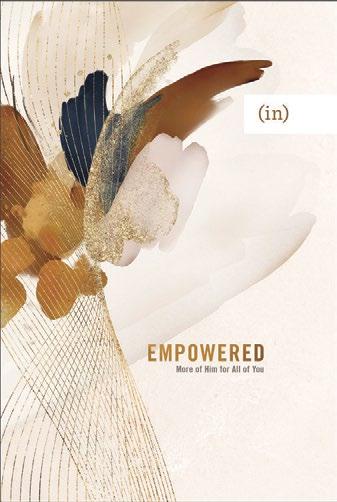 By (in)courage
[Revell Books, a division of Baker Publishing Group]
By (in)courage
[Revell Books, a division of Baker Publishing Group]
When you’re left feeling less than, incapable, or not enough, Jesus sees you as valuable, whole, and good. Through Scripture, stories, prayers, and reflection questions, this devotional will help you cultivate each area of your life to live fully as God created you to be. You can find it at https://bit.ly/EMPOWEREDBBH
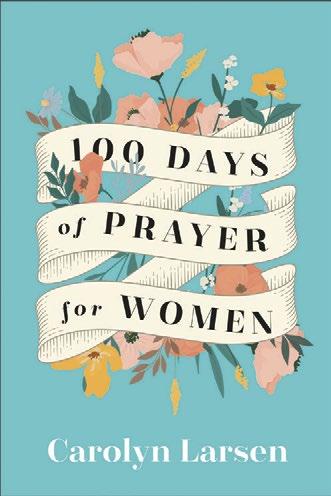 By Carolyn Larsen
[Revell Books, a division of Baker Publishing Group]
By Carolyn Larsen
[Revell Books, a division of Baker Publishing Group]
This beautifully designed collection of go-to prayers is perfect for when you want to talk to God but don’t know what to say. Covering the challenging, the joyful, and even the mundane aspects of life, these prayers help you have a conversation with the God who loves you. You can find it at https://bit.ly/100DaysBBH
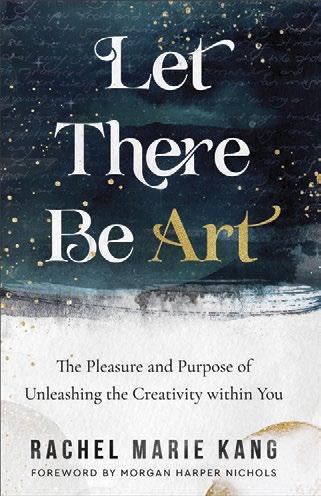 By Rachel Marie Kang
[Revell Books, a division of Baker Publishing Group]
By Rachel Marie Kang
[Revell Books, a division of Baker Publishing Group]
Let There Be Art gives you permission to embrace the peace, pleasure, and spiritual impact of your artistic outlets. This creative and cathartic journey will free you to create truthfully, as well as offer your heart and your art in hopes of helping a hurting world. You can find it at https://bit.ly/BeArt24
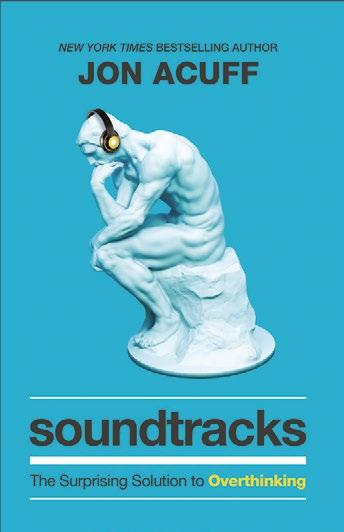 By Jon Acuff
[Baker Books, a division of Baker Publishing Group]
By Jon Acuff
[Baker Books, a division of Baker Publishing Group]
Discover a refreshingly honest and humorous look at overthinking. You’ll learn to identify what it masquerades as (being prepared), call it what it really is (fear), and embrace a simple plan to turn it from a super problem into a superpower. You can find it at https://bit.ly/SOUNDTRACKS24
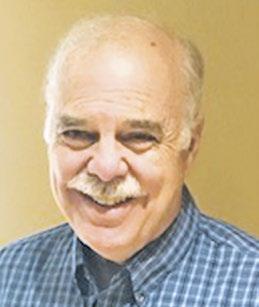
In his 30 years as a sportswriter, Gail Wood has written for many magazines and newspapers, including USA Today. He has talked with many famous athletes and shared their Christian faith.
If you have a turning point in your life you would like to share, email your story to editor@ todayschristianliving.org
All submissions must be under 800 words. If we print your story, we will pay you $75. We reserve the right to edit for length and content.
All submissions become the property of Today’s Christian Living
By Gail WoodBefore Cooper Kupp became an All-Pro wide receiver for the LA Rams, before he became an All-American at Eastern Washington University, before he’d play in the Super Bowl, he had to overcome one major obstacle.
He had to overcome self-doubt.
“I had so many failures,” Kupp said as he shared his Christian faith with an attentive church crowd. “My story is about where we fall short.” And in his struggle to overcome, in his determined drive to become a wide receiver in the NFL, Kupp found hope in an unusual place. He found it on his knees, praying to God and asking for help. His testimony is about overcoming and committing himself to God.
“I know I’ve had many failures in my life,” Kupp said. But Kupp overcame those failures as a wide receiver for the Los Angeles Rams. He led the NFL in receiving in 2023 and led the Rams to the Super Bowl in 2022.
At a young age, Kupp had a passion to play football, to race under a long, deep pass and make a catch.
“I put on the pads the first time and it was like sitting down in front of a plate of pulled pork sandwiches,” Kupp said with a grin. “It’s hard to explain how excited I was to play football.”
But early on, Kupp had a shortfall. He was small — too short. The audience laughed as he posted pictures of himself as a freshman in high school. He was much smaller than his teammates.
“That’s the wall I hit,” Kupp said with a chuckle. “When I hit this point, I started questioning.”
Kupp didn’t give up. He didn’t quit playing football. In time, a growth spurt helped transform Kupp from a dreamer, from a “wish-I-could” back up, to a starter, to an all-conference, All-American wide receiver. Kupp thanks God for blessing his life, for helping him fulfill his dream of playing pro football.
“Those deep, dark days helped me,” Kupp said. Those setbacks and disappointments helped Kupp realize one important thing. He realized he couldn’t do it by himself.
“Those deep, dark days. I’d not be here if God had not sucked me out of those moments,” Kupp said. “I’m so incredibly thankful for what He’s done for me.”
Kupp talked about commitment, the focus that needs to be on God. He talked about doing your best to fulfill God’s plan for your life. He read I Corinthians 9:24-27, which talks about how only one runner in a race gets the prize. So, Kupp emphasized how important it is to run with passion and commitment, seeking God with all your heart.
“Run in a way to get the prize,” Kupp said. “Run to win.”
However, Kupp said winning isn’t something we do on our own gumption or our own will to win. Hardships will come. Rather than saying, “woe is me,” he encouraged us all to seek God and ask for help and direction.
“We have these moments of frustration,” Kupp said. “These moments where we lack understanding.” God knows what the future holds. He can guide us. He can help us through whatever lies ahead.
Kupp also talked about how everyone has the same 24 hours in a day. What do we do with that time on a daily basis? “How would your 24 hours look?” Kupp asked. Pursuing God is the most valuable thing we can do with our time.
As Christians, we can lean on Jesus Christ as we seek Him in prayer and in the Bible, God’s word. There’s a foundation being laid, a structure of hope and commitment. The purpose is to seek God and His plays for your life, both in the good times and in the bad times.
“So, in your hour, in your trials, in your persecution, in your hardship, believe in your place, believe you are where you are supposed to be,” Kupp said. “In those pitfalls, cry out ‘Abba Father. Glorify your name.’ It’s in those moments, in those times that we fall down on the ground and that we lie down so that Christ can be raised and be exalted.”
As Kupp said, it’s in hardships our testimonies can shine brightest. Encourage those who are going through hardships. Let your light shine — “that your light will shine brightly in the darkest places,” Kupp said.
Let your light shine before men in such a way that they may see your good works, and glorify your Father who is in heaven.
Matthew 5:16
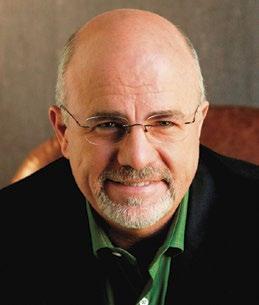
Dave Ramsey is a seven-time #1 national best-selling author, personal finance expert, and host of The Ramsey Show, heard by more than 18 million listeners each week. He has appeared on Good Morning America, CBS This Morning, Today Show, Fox News, CNN, Fox Business, and many more.
Since 1992, Dave has helped people regain control of their money, build wealth, and enhance their lives. He also serves as CEO for Ramsey Solutions.
By Dave Ramsey
Dear Dave,
I’m about to start paying off debt in Baby Step 2, but there’s a motorcycle loan my ex-girlfriend took out for me. I crashed the motorcycle and sustained some injuries. After two months of litigation, I received a settlement of about $15,000 that was just enough to cover the loan. Do I use the settlement money toward my debt snowball, or should I pay her back so I can get her out of my life for good?
— ArnoldDear Arnold,
Pay her back. Anything else would be unfair. And, on top of that, it’s just the right thing to do.
The whole move of her taking out a loan to buy you a motorcycle was kind of dumb anyway. It was dumb on her part, and it was dumb on your part. And you can see why it was now, can’t you? It has left you in a lurch emotionally and relationally. We’re not talking about a random chunk of cash here. This money was for the motorcycle, from the motorcycle and about the motorcycle. So, you just pay her back, and that’ll clear things up.
I’m sorry the relationship didn’t work out, brother. But I’m glad you’re taking steps to be in control of your finances. And I hope making things right where the bike is concerned will bring you a little peace of mind.
— DaveDave,
Recently, I made a few hires for the upcoming season for my lawn care business. They’re all good, motivated people, but one really stands out from the rest. I could see him moving out of the field and into a sales position before the end of the year. How should I begin laying the groundwork for this idea?
— Dan Hi, Dan,This is great to hear. Believe me, I know the feeling when you look at a roomful of people and realize you’ve built a really good team. I’m excited for you!
One of the first things I’d do is talk to some other owners of landscaping companies outside your area that are about your company’s size and pick their brains as to how they’re structured. Let them know you’re thinking about hiring your first salesman. Find out how they pay their team and if it’s working well for everyone.
What we’re talking about here is called best practices in business. Find something that works for someone else in your industry and apply it to your specific situation. Think about it this way: If you wanted to lose weight, you’d begin by doing what people who have shed some pounds are doing, right? You want to emulate behavior that’s been proven to generate positive results.
I’d also advise you to make sure the person you’re talking about is on board with the idea and that he understands that any compensation agreement you initiate in the beginning will be implemented on a trial basis for a specified length of time. You’re venturing into uncharted territory here, Dan, so come up with a temporary compensation plan that’s satisfying to you both at the onset. Then, have an agreement to revisit the plan in 90 days, six months or even a year down the road. There may be a little bit of give and take involved, and it’ll take some time, but at the end of the day, you’ve both got to be okay with the upside and downside of the scale and the results.
You’ll both be really happy if he’s busting it and making himself and the company successful. But as a business owner, you’ll want him to feel a little pressure if he’s not producing—for himself and for you!
— DaveMy parents are both in their seventies. They have been healthy and active all their lives. In spite of them both having good jobs, they neglected to plan and save for retirement. Is it my responsibility now to provide them with financial help in their old age?
— ReaganIt sounds like you might be a little irritated that your parents haven’t been responsible with their money. The way you described the circumstances, it’s understandable—to a point. But in my mind, there’s a bigger question when it comes to helping your folks. How big is the burden?
Let me ask you a few things. Do you have the money to help? Now, can you provide this help without your own family suffering or going without? If both answers are yes, I think your question may be a little more about your own aggravation with your folks than any ethical or moral obligation.
A few years ago, I spoke with a guy who was in really good shape financially. He made over $1 million a year, and he had plenty set aside in savings and retirement accounts. His father was in poor health and had never handled his money wisely. The son asked me if he should help out his dad by giving him some money every month.
In my mind, there’s no question the right answer was yes. And that’s what I told him. If you’re making millions, but don’t want to help out your sick dad, there’s something wrong with you. There’s something missing inside you that money just won’t fix. However, if you and your family are barely getting by—let’s say you bring home $3,000 a
month—you’re not morally required to help a parent who was irresponsible with money their entire life.
I’m not sure what your situation is, Reagan, but I hope you’ll look at things with a little grace and reason. It’s a tough situation to be in because it sounds like your heart is being pulled in different directions. My advice, above all else, is to pray about it. And, if you have a spouse, talk to them about everything, and make sure the two of you are in agreement on what should be done before moving forward.
God bless you, friend.
I’m going to sell a rental cabin I own, and the sale should bring me about $388,000. Should I take the proceeds from the sale and use it to pay off my home and other debt or use the money to buy another, similar rental property where I could collect about $1,500 per month in rent? Right now, I owe $200,000 on my home, and I have just under $50,000 in miscellaneous debt.
— ValerieLet me start by asking you a question. If your home were paid for and you didn’t have a mortgage at all, would you take out a loan against your home to buy a rental property? Let me give you a hint. The answer should be a big, fat no.
The shortest distance between where you are right now and a high-quality financial life—including wealth building—is getting your home and other debt paid off. Then, use the cash flow that’s freed up, and the increased peace of mind, to rapidly pile up a bunch of money and buy another rental property.
There’s nothing wrong with owning rental properties and other kinds of real estate, Valerie. I love real estate, and today, I have several rental properties of my own. The difference is I bought all of mine with cash. I didn’t go into debt for them. I learned my lesson about debt the hard way over 30 years ago, and I don’t want you to take a chance on suffering through all that, too.
Use the money from the sale of the cabin to pay off your home and other debt, and to make sure you’ve got a solid emergency fund of three to six months of expenses set aside. After that, if you want to start saving aggressively for another rental, go for it. Just make sure it’s a smart buy when the time comes and that you pay for it in cash!
— Dave 
Christian publishers are diligently making new resources available to help build up the body of Christ. There are Bible studies, study Bibles, devotionals, and prayer journals to guide us in our personal pursuit of God. There are memoirs and biographies to remind us that we don’t walk alone. There are books intended to help us overcome the hardships we encounter throughout our lives and encourage us along the way. And there are books that offer a godly perspective on life through characters and circumstances born in the author’s imagination. Here are just a few new resources for you to consider.
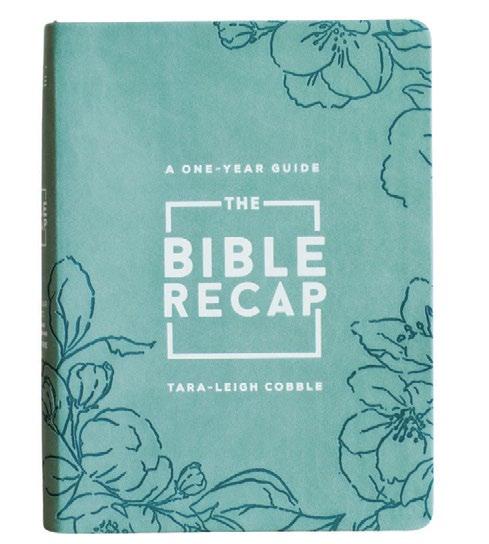 By Tara-Leigh Cobble [Bethany House Publishers]
By Tara-Leigh Cobble [Bethany House Publishers]
This chronological Bible companion explores the story of Scripture so you can read, understand, and love God’s Word. This special edition—complete with a ribbon marker and imitation leather cover—makes a meaningful gift for a loved one. Also available in brown or personal size for 30% off at BakerBookHouse.com
 By Leslie Copeland [Judson Press]
By Leslie Copeland [Judson Press]
A timely and refreshing book for leaders to reflect and rethink who they are as leaders. They are encouraged to examine their lives truthfully and carefully to grow spiritually while faithfully operating as servant-leaders. Copeland reminds leaders that such characteristics as courage, commitment, and compassion are essential to good leadership. You can find it at https://www.judsonpress.com/Products/J305/ 247-embodying-christlike-leadership.aspx
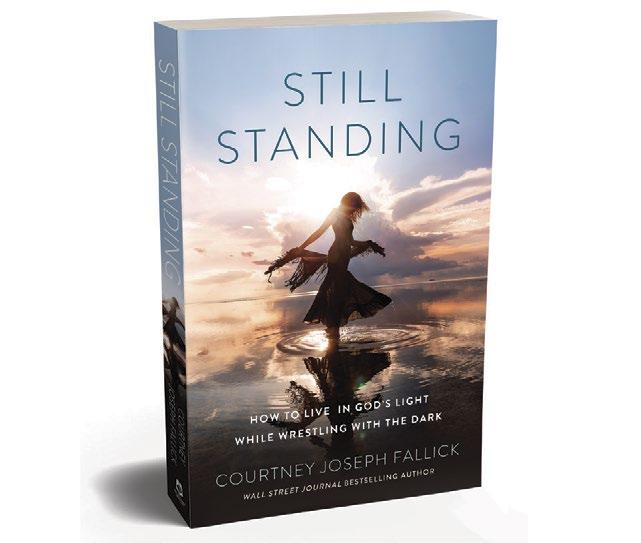 By Courtney Joseph Fallick [Bethany House Publishers]
By Courtney Joseph Fallick [Bethany House Publishers]
After her husband’s betrayal, Courtney Joseph Fallick was drowning in fear, shame, and grief while God seemed silent. With vulnerability, she infuses women with hope that their valleys will end, showing how to rise, cling to God’s promises, and move victoriously forward stronger than before. Shop 30% off at BakerBookHouse.com
 By Willie Robertson [W Publishing Group]
By Willie Robertson [W Publishing Group]

Gospeler by Willie Robertson is a guide to sharing the Good News of Jesus with ease and authenticity. Drawing from personal experiences, he empowers readers to initiate spiritual conversations with family, friends, and strangers. Robertson demonstrates that spreading the gospel is a simple yet powerful act that can transform lives. Learn more: gospeler-book.com
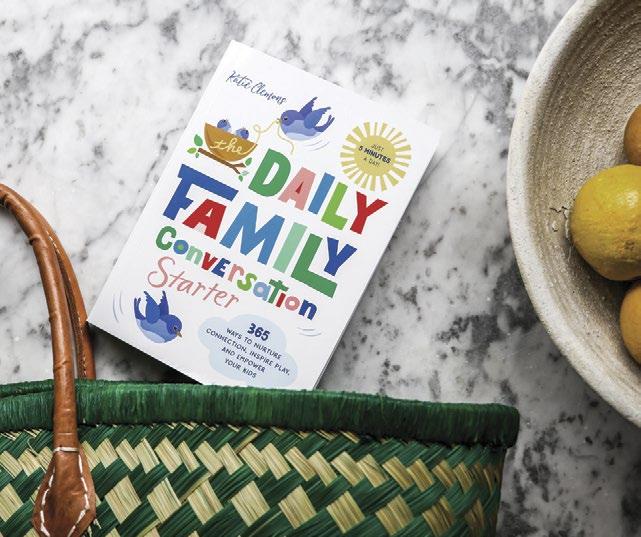 By Katie Clemons [Harper Celebrate]
By Katie Clemons [Harper Celebrate]
Your stronger family connection starts here with just 5 minutes of conversation each day. The Daily Family Conversation Starter contains 365 easy and imaginative ways to check in with your kids, develop their growth mindset, and get both serious and silly—together! You can find it at https://a.co/d/5eBrLSm
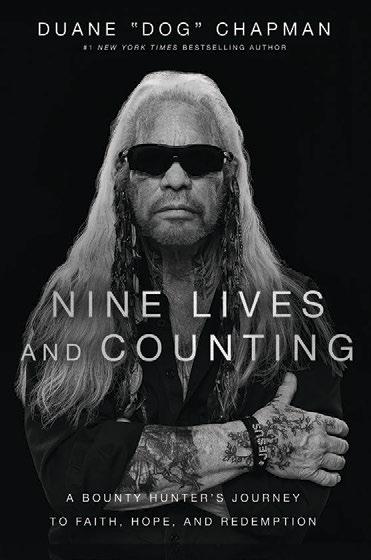 By Duane “Dog” Chapman [Nelson Books]
By Duane “Dog” Chapman [Nelson Books]
Within Nine Lives and Counting, Duane “Dog” Chapman not only offers a fresh perspective on well-known life events but also ventures into stories about his faith that he’s never shared publicly. You can find it at https:// ninelives.dogthebountyhunter.com
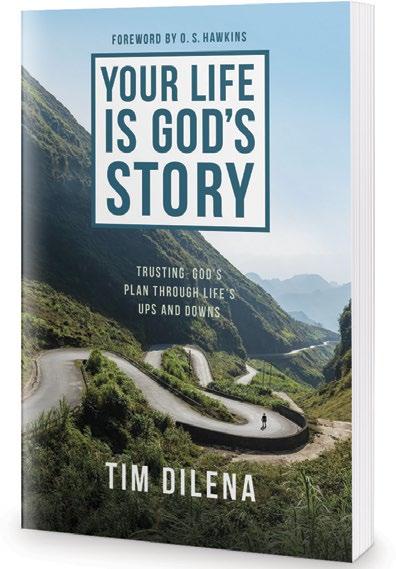 By Tim Dilena [Zondervan Reflective]
By Tim Dilena [Zondervan Reflective]
Written by the pastor of Times Square Church, this inspiring book offers biblical stories and powerful testimonies that encourage faith in God’s plan for your life, even when that plan includes unexpected twists and turns. You can find it at bit.ly/dilena
 By Caroline Fanning
By Caroline Fanning
It can be nerve-wracking to pack your child’s bags and drop him or her off at Bible camp for the week, especially for the very first time. After all, you’re probably leaving your child in the care of strangers. How do you know Johnny will be safe? How do you know Susie will have fun? Will they learn God’s truths? Is sending them to camp worthwhile?
It certainly can be. God works in special ways at camp. It may be the songs around a campfire on a starry night, or the comradery of a cabin group on an adventure, or the spiritual insights from new voices. Maybe it’s a combination of things. This I know; a well-chosen camp can open a whole new world to your youngster or teen.
Bible camp has the potential to have an eternal impact on a child’s spiritual life and God’s kingdom. Kids often form ties to “their” camp and it quickly becomes home away from home, the place they return to every year to reconnect with God and friends.
A week away from home, social media and everyday life gives kids a chance to focus on God. They can discuss Bible sessions with their counselors. They can immerse themselves in creation. They can find a quiet place to listen for God’s voice and work out their relationship with Him, wherever they are on their spiritual journey.
A week away can help kids mature emotionally, as well. Camp puts kids outside their comfort zone in healthy ways. They meet and befriend people from different communities, churches and cultures. They gain confidence in their own abilities. They have a chance to pursue new opportunities they may not have elsewhere. In the process, they sometimes discover new interests and passions.
Believe it or not, sending kids to Bible camp is good for parents, too. It’s a safe, first step toward helping your child become independent. Our children really belong to God, not us. He
knew them and loved them before we did. He loans them to us for a time, entrusts us with their care and training, then requires them back. Letting go, a little at a time, makes the day you drop them off at college much easier.
What makes me so certain going to Bible camp is worthwhile? My walk with God was immeasurably impacted by my years at camp, both as a camper and a staff member. My spiritual hero, Reverend Richard Neale, was the director of the camp I attended. He taught me the Author of the Word is also the Author of the world. God reveals Himself in both places.
I was at camp the first time I clearly heard God’s voice while sitting in a grove of white birch trees, overlooking the lake. It was a particularly hard summer on staff that led me to say, “I will follow you, Lord, wherever you lead me.” And I discovered my love for whitewater canoeing at camp. I still love to dip my paddle into the fast waters and maneuver through the rapids.
Camps come in all shapes and sizes. Some are rustic, others are modern and resort-like. Some have a handful of activities while others offer campers many, varied options. Some camps are large, others are quite small. Some have denominational affiliations while others are non-denominational. What all excellent Bible camps have in common is the staff’s commitment to helping children and teens grow in their faith.
While there are no guarantees your child will never be homesick, have conflicts with cabinmates or be injured while at camp — or that camp will always be a fantastic experience — there are some things you can do to help ensure Johnny or Susie will enjoy camp so much they want to go back.
Pray. Ask God for direction. Ask him to clearly show you the right time and the right place for your child. Pray for the staff of the camp. Pray for your child’s time away from home. If you are struggling with the decision, ask for God’s peace. If you don’t have peace, consider whether the Spirit guiding you away from a potentially harmful situation or your own fears are troubling you.
Prepare your kids for the experience. Before sending your kids to camp for a week, get them involved in shorter-term activities, such as Vacation Bible School or day camps, where they are away from home for several hours.
Consider whether your child is old enough, in age and maturity, to attend camp for a week. Most week-long youth camps are geared toward third-graders to high-schoolers. Your child may be old enough to attend camp, but it’s okay to wait a year if they would benefit from the added maturity. It will make for a better camp experience.
Choose a Bible camp suited to your child’s needs and interests. While many Bible camps offer general programs, some specialize in specific interests or needs. There are music camps, sports camps and horseback riding camps. There are camps that offer marine biology trips, ministry opportunities and more. There are also camps for kids with special needs that are equipped to offer them the care and accommodations they require.
Get recommendations. Many churches have ties to a certain camp. Ask your church leadership where they send their own children. You may also have friends who could recommend a good Christian camp. Find out what they do and don’t like about the camp. People with first-hand experiences will tell you what’s not in the promotional brochure or on the camp’s website.
Do your research. Find out as much as you can about the camps you are considering. The Christian Camp and Conference Center website is a good place to begin your search. Visit the websites of camps that interest you. Read their doctrinal or faith statement. If you want your child’s camp experience to align with your household beliefs, choosing a camp affiliated with your denomination might be best.
If it would make you feel more comfortable, see if you can arrange a visit to the camp you’re considering. Meeting the staff and touring the facility may alleviate (or confirm) your concerns.
Consider the Cost. Camp costs range from reasonably affordable to quite costly. Cost does not necessarily equate quality. There are some excellent, affordable camps. There are also some mediocre, expensive camps. Send your kids to the best camp you can afford. Expect a week to cost anywhere from $250 to $600, depending on the facility, and start saving. It’s a worthwhile investment in your child’s life.
Many camps have camper scholarship funds available. If you find a camp that’s the good fit, but out of your price range, see whether they have resources available to help you.
I saved the most important thing for last. Choose a camp where the staff, particularly the counselors, are trained before camp starts.
Most college students, the people who will most likely care for your youth or teen, are not equipped to deal with issues that surface - not without some preparation. They need to learn how to help the homesick nine-year-old get through the week,
what to do when the 12-year-old tells them about an abusive home life or how to maintain their authority with a cabin full of teens.
Consistently positive camp experiences come with consistently trained staff. Everyone on staff understands the policies and procedures. Everyone is on board with the camp’s ministry goals. Everyone knows what is expected of them. The staff should be a unified support system for your child. The whole staff — those in visible roles and those in not-so-visible roles — makes the camp! The people make it a place that will (or will not) have an eternal impact on someone’s life.
If you’ve never done it before, pray about giving Bible camp a chance this summer. Decisions made at camp have the power to impact the world for Christ.
Caroline Fanning lives on a Wisconsin hobby farm with her husband, John. They have four grown children and two grandchildren. When she isn’t busy doing chores or experimenting with new recipes, Caroline enjoys writing and hand-embroidery.
The Christian Camp and Conference Association (CCCA) has been supporting camps that comply with their Statement of Faith since the 1960’s. Members who are affiliated with CCCA receive training and practical help to give every camper a great week at camp. They also hold members accountable for providing a safe environment for those who attend.
Their website is a good place to begin a search for the right camp. Though they only list their members, they have tools to help you find the type of camp you’re looking for with the types of programs you’re looking for.
Over the years, CCCA has tracked the impact of Christian camping on individuals, churches and other ministries. Keep in mind, these numbers reflect only the reach of their affiliates. Non-member camps carry the reach even further.
According to the CCCA’s 2009 Waypoint Research:
• Every year, more than 5.5 million people attend CCCA events, member camps and conference centers worldwide.
• Every year, tens of thousands come to faith in Jesus Christ through their involvement with a camp or conference center.
• More than 400,000 adults are now involved in fulltime Christian work as the result of decisions made at CCCA member camps and conference centers.

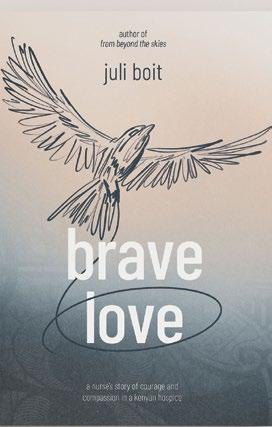
Embark on an extraordinary journey with Juli Boit, a Family Nurse Practitioner who spent 18 years providing hospice and palliative care to adults and children in Western Kenya. She also provides care and guidance to her children who are navigating the ups and downs of chronic illness . Brave Love is a story of both loss and joy that unfolds this truth: love is ever evolving. Readers are invited to embrace discomfort, reimagine their life perspectives, fearlessly confront their doubts, and recognize the shared humanity that binds us all together. Boit hopes readers will find an invitation in her pages; an invitation to seek out ways to grow in love toward family members, friends and neighbors and, in the process, grow more compassionate. This book is available through her website, julibolt.com
Pastor Craig Groeschel knows from personal experience, and as a counselor to others, what being trapped in a cycle of poor decisionmaking is like. In Think Ahead, he shares what he has discovered about the power of “pre-deciding.”
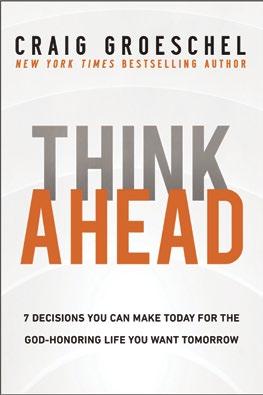
With thought-provoking exercises and questions for reflection, this interactive book teaches us that the quality of our decisions determines the quality of our lives. Think Ahead will help you:
Understand the science behind your decision-making habits
Overcome decision fatigue and debilitating fears
Diminish the role of emotions in decision-making
See how your small choices shape the kind of person you become
Define and put into action the seven life-defining pre-decisions you can make today
Becoming the person you want to be starts before you make a decision. In Think Ahead, you’ll discover the power of making decisions today to help you live the life you want to have tomorrow.
As a child, artist and potter Dani Bennett witnessed the brutal murder of her parents. With no memory of the incident or her true identity, she was forced to take on a new name and a new life, hidden away in Montana for the past 25 years.
Mae Richmond spent that same time searching for her granddaughter, who went missing the night her daughter and son-in-law were murdered. Convinced the woman she saw in a pottery magazine is who she’s searching for, she enlists the help of K-9 officer Mark Lassiter of Pearl Springs, Tennessee, who tracks Dani down.
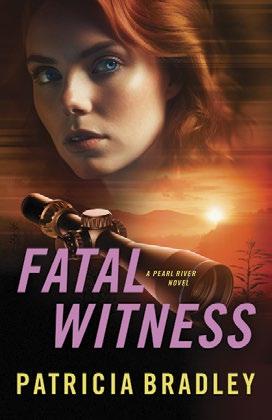
Skeptical but curious, Dani begins a journey to uncover the secrets of her past and reclaim her true identity. But someone close to her is determined to keep the truth of what happened all those years ago hidden. (Pearl River Book #2)
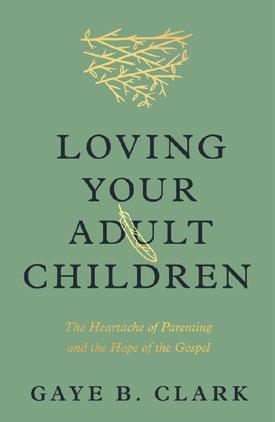
As kids grow, so do the pains of parenthood. Patterns of miscommunication and resentment can cause damage over the years, leaving parents and adult children with a fractured relationship. Confused, hurt, and sometimes angry, moms and dads can struggle to know where to turn for help and where to look for hope.
With grace and empathy, author Gaye B. Clark comes alongside readers bearing the weight of parenthood. Encouraging readers to view themselves as image bearers of God first and parents second, Clark shifts readers’ focus to their relationship with Christ while showing how the relationship between parent and child can be a catalyst for understanding the gospel. Loving Your Adult Children examines the fruit of the Spirit in relation to parenting adult children, offers study questions for reflection, and shows how walking with God is the best next step for struggling parents.
Home is where we recharge and rest, where we learn and grow, and where we welcome others. And for Christians, our home can be a small reflection of God’s kingdom on earth.

Sometimes our homes feel anything but peaceful, ordered, or representative of who we are. Reimagine Home could be an inspiration, your personal invitation to quiet all the voices of comparison and tune in to what matters in your home—creating a space where you can know God’s love and share it with others.
With twenty-eight devotions that span the four seasons of the year, Galimba encourages you to create the home you want on a schedule that works for you. Helpful hints and tactics are accompanied by inspiring photographs pointing toward peace instead of perfection. You’ll learn to curate a home that reflects who you are and welcomes others.
Many people today idolize achievement, driven by validation, status, or financial gain. Others lack self-discipline and motivation altogether. How can Christians pursue healthy, biblical goal-setting that avoids extremes?

In this user-friendly guide, Ana Ávila teaches 6 principles to help you honor God with all you have and reflect his character through your creativity. Along with a gospel-centered perspective on life, you’ll learn skills to increase efficiency, such as forming healthy habits, using productivity tools, creating tasks and projects, and more. Whether you are achievement-oriented or struggle with discipline, Ávila will show you how to reorient your time, boundaries, decisions, focus, habits, and tools around God’s main design for productivity: serving him and helping others.
Interactive: Each chapter ends with questions for reflection and action steps
Practical: Includes sample schedules, tips for forming healthy habits, and more
Previously Published in Spanish

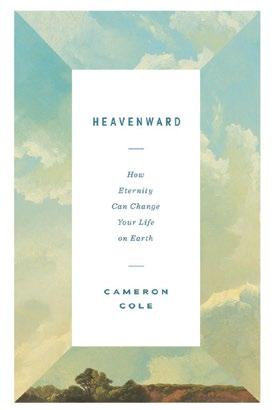
Though they’re destined for eternal glory, many Christians languish in earthly mindedness. Having never set their sights on things above, they lack hope in adversity and vibrancy in their faith. Where can believers find joy and inspiration for everyday life? It’s in the alreadyand-not-yet reality of heaven.
Following the unexpected loss of his firstborn child, pastor Cameron Cole’s daily focus shifted drastically heavenward. He discovered that an intentional eternal mindset can bring meaning and joy to every Christian’s life. In this heartfelt, theologically rich book, Cole draws from his personal story of grief, the apostle Paul’s letters, and the examples of believers throughout history to demonstrate how heavenly mindedness fosters contentment, hope in suffering, motivation for missions and evangelism, commitment to morality and ethics, and no fear in death.
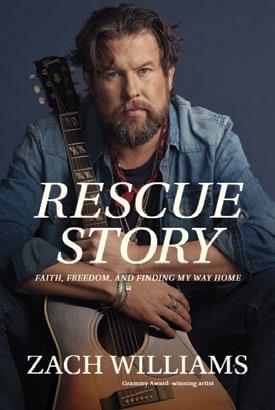
Before two-time Grammy Award winner Zach Williams penned heartfelt, faith-filled ballads, there was darkness. As a rock-and-roll singer, Zach thought he had all he needed for happiness but felt empty. The drugs, alcohol, and latenight gigs played around the world couldn’t satisfy his longing for a place to belong. He was desperate for change.
It came while on tour in Spain with his band. In this poignant memoir, Zach shares in vivid detail his personal Rescue Story. He reflects on his childhood, the prophecy that gave his parents hope, his descent into substance abuse, and the rescue he didn’t think was possible.
A compelling, honest story of God’s unconditional love, grace, and redemption, Rescue Story shares Zach Williams’ intimate journey and challenges you to seek resilient hope in your own trials - because Jesus offers real freedom and joy, despite the mistakes of your past.
Proclaim the Word more and argue about it less.
— William Cameron Townsend
When I consider the cross, how can anything I do be called sacrifice?
— Amy Carmichael To know the will of God, we need an open Bible and an open map.
— William Carey






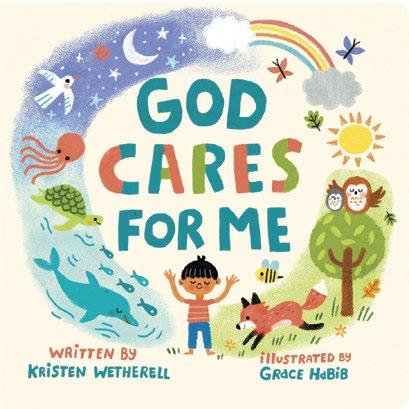
[Crossway]
Everyone’s a theologian, even your little one. Each board book in the For the Bible Tells Me So series offers kids ages 0–4 an introduction to key facets of the gospel and a glimpse at the joy found when children embrace Christ as their Lord and Savior. In God Cares for Me, author Kristen Wetherell explores God’s creation and providence, revealing his abundant care for the things He has made, including His children! This board book uses repetition, easy-tounderstand language, and interactive elements to keep kids engaged and coming back again and again. Deeply rooted in Scripture, Wetherell’s words highlight God’s power, creativity, and provision for His people to teach children about the comfort found in Christ. This book (and series) would make an ideal gift for children, grandchildren, loved ones or a church ministry.
Afive-year-old boy went for a weekend trip with his grandparents. On the way home, they stopped at a country restaurant for lunch.
The little boy left the table to use the restroom by himself. A moment later he returned with a confused look on his face. He said, “Grandpa, am I a rooster or a hen?”
From Mikey’s Funnies www.mikeysfunnies.com
If you have a joke or funny story you’d like to share, email editor@todayschristianliving.org. If we print your joke, we’ll pay you $25.

Will Morris is the Middle East Correspondent for Morning Star News and one of its founding writers. He is an award-winning journalist and photographer whose byline has appeared in numerous domestic and international publications including The New York Times, The Washington Post and even Stars and Stripes
Mr. Morris has spent roughly a decade covering the Persecuted Church and conducting research about freedom of religion - mostly in the Muslim-majority countries in which he lived. He also covers national security and environmental issues.
Will Morris holds a degree in International Studies from the Ohio State University where his coursework focused on the Middle East and Development. He is a veteran of the United States Marine Corps, where he served in the infantry. You can contact Mr. Morris at veritas@ witnessmedia.org
You would think by 2023, the year the final vote was taken, it would seem like a bad idea for any nation to pass a law criminalizing blasphemy. A colossally huge, remarkably shortsighted, overwhelmingly undemocratic, really, really bad idea. And you would be right. And yetfor some reason — the Danish Parliament recently did just that.
The new law, which forbids the “inappropriate treatment of a text that has a significant religious importance to a recognized religious community,” was added to the Danish Penal Code in December in response to the international backlash over a series of anti-Islamic demonstrations that took place over the summer in Denmark and Sweden. During the demonstrations, a handful of DanishSwedish right-wing provocateurs burned copies of the Quran at several high-profile locations including the Turkish embassies in Sweden and Denmark. At the same time, at the Stockholm Mosque in Sweden, a man of Iraqi origin tore apart a Quran, placed a piece of bacon on top of it and set it on fire. He then went on to desecrate the Quran in other protests, notably one in September that caused a riot in Sweden.
News of the Quran burnings traveled quickly, and the response was predictably violent. Riots broke out in Muslim-majority cities around the world. In July, protestors forced their way into the Swedish embassy in Iraq and set parts of it on fire. In October, two Swedes were killed at a soccer game in Molenbeek, Brussels by an ISIS sympathizer who said, in a video, he targeted the men because they were Swedish. Additionally, numerous Muslimmajority countries either broke off or downgraded their diplomatic relations with Denmark and Sweden. The Turkish government went so far as to use the burning incidents as a reason to stall the accension of Sweden into NATO.
In an official statement in July, Swedish Prime Minister Ulf Kristersson announced he had been in “close dialogue” with the Danish Prime Minister over the new-found security situation, which he characterized as the “most serious” since the World War II. A month later, Sweden raised its terrorist alert level to “high” after thwarting several undisclosed attacks by terrorists, the Swedish government said. Soon after, in September, Proposal L133 - commonly known as “the Quran Act” — was submitted in parliament.


Blasphemy laws are without exception, terrible ideas. You can’t legislate freedom from offense any more than you can legislate reverence in someone. Also, regardless of how we feel about public irreverence, God can handle it. As I learned from the rather blasphemous Monty Python movie “The Meaning of Life,” God is big. If you think God can’t handle being questioned, even aggressively, maybe you are worshiping the wrong one.
What does all this have to do with the persecution of Christians? Well, a lot actually. Currently some 95 countries have blasphemy laws of one sort or another. Sentences range from small fines to the death penalty. In my time covering religious persecution, it has been my experience that blasphemy laws are used overwhelmingly against Christians, with other secondary targets being journalists and political dissidents. In the 49 Muslim-majority countries, blasphemy laws have been weaponized with great effect to strip Christians of their dignity, property and in some cases — their lives.
It was no surprise that non-profit organizations, religious advocacy groups and representatives from Western democracies came out in force to oppose the Danish law. They are constantly engaging the leaders of Islamic countries in an effort to amend or hopefully strike down their blasphemy laws.
At a minimum, the groups strive to protect people falsely accused under the laws. The advocates are often met with denial about how the laws are used to target Christians. They also hear accusations that the West is patronizing and hypocritical to put pressure on other countries to change the laws in the first place. Denmark’s blasphemy law, passed when all eyes in the Islamic world were focused on them, only goes to support their argument. It destroys years of work to keep new blasphemy laws from being written. Now Muslim-majority countries have more cause to ask, if blasphemy laws are good enough for Denmark, then why are they contemptable for us?
Pakistan is arguably the worst place to be accused of blasphemy. In Pakistan, the penalty for blaspheming Mohamed, Islam’s prophet, is death. And Christians are routinely falsely accused of violating the law. Christians accused of blasphemy in Pakistan, and even Muslims who support the innocence of accused Christians, are routinely killed by mobs before they have a chance to stand trial. The best-known blasphemy accusation in Pakistan was probably the case of Asia Bibi, a Christian woman who was falsely accused of blasphemy in 2009.
While working in the fields collecting berries, Bibi was sent to fetch some water. When she found a metal cup on the
ground, Bibi took a drink of water from the cup, enraging a neighbor of hers. The woman told Bibi that Christians, who are considered unclean by many Pakistanis, are forbidden from drinking out of the same cups as Muslims. She demanded Bibi convert to Islam, insulted her and accused her of insulting Mohamed. In 2010, Bibi was convicted of insulting the prophet and sentenced to death. Bibi denied all the charges and eight years later Bibi was acquitted for lack of evidence. Although the acquittal was welcome news, Bibi spent eight years imprisoned on death row, much of it in solitary confinement. Bibi’s family was also forced into hiding for their own safety.
The threats Bibi and her family feared were not unfounded. Pakistani Minorities Minister Shahbaz Bhatti and Punjab Governor Salmaan Taseer were both assassinated merely for demanding Bibi receive a fair trial and for opposing blasphemy laws. Bibi was eventually released and immediately fled to Canada.
Currently, members of hardline Islamic parties in Pakistan are trying to expand the country’s blasphemy laws. The new Danish law will only legitimize their argument. For the sake of Christians in Pakistan and across the Islamic world, the Danish law must be stricken.
The United States Commission for International Religious Freedom issued a statement condemning the burning of the Quran in Denmark and Sweden but added that Denmark’s answer to the problem was wrong.
“Criminalizing blasphemy is the wrong approach and not effective in addressing either security concerns or the underlying hatred experienced by religious communities,” said USCIRF Commissioner David Curry.
PRAY that Denmark will strike down its new anti-blasphemy law.
PRAY that extremists in Denmark and Sweden will come to know Christ and find better, less inciteful ways to protest their disdain of Islam.
PRAY that God will protect messengers of the gospel in Europe from false allegations under the continent’s many new “hate speech” laws.
PRAY that all the believers in Muslim-majority countries who are accused of blasphemy will be strengthened and move in the Holy Spirit.
As dusk chases daylight over the horizon, the frogs pause in awed silence to listen to the whippoorwill. I listen with them, straining to hear the distant bird announce the coming night. It sounds like a vinyl record with a skip in it, forever repeating its lilting tune in precise sameness, “whippoorwill, whippoorwill, whippoorwill…”
Suddenly it stops, as though someone lifted the needle from the record. The frogs take up their song again, but only while the whippoorwill catches its breath. The dueling music goes on until, finally, an old owl politely but firmly questions, “Who-who, who-whoooo is making all that racket?” Silence falls in the forest.
Whippoorwills are unique birds, protected from predators by their nearly perfect camouflage. I almost stepped on one once — not a nest, on an adult female protecting her nest. It lay perfectly still, even when I was a mere footstep away. Though I’ve often heard whippoorwills herald nightfall, it’s the only one I’ve ever seen.
I’m continually amazed at how carefully God created every living thing. Why are some creatures made to blend in with their environment and others made to stand out in it? How can each instinctively know how best to ensure not

only its own survival, but the survival of its offspring? How can an insect, hatched without ever encountering its parents, know what to do without even a rudimentary education?
I don’t have the answers, which is literally wonderful. Such questions leave me awed by the God I serve. I don’t know who Agur was, but I like the guy. I think we would be kindred spirits. He starts out Proverbs 30 by saying, “Surely I am more stupid than any man.” Yep, that pretty much sums up how I feel when I consider the same things Agur considered: like how eagles are able to soar so effortlessly, or how snakes can crawl when they have no legs, or how great God must be to gather the wind in His fists and the waters in His garment.
“Great is the Lord and highly to be praised, and His greatness is unsearchable.”
— Psalm 145:3
Science has answered many questions. I’m very thankful it will never answer all of God’s mysteries. His unfathomable depths invite us to “stand and consider the wonders of God.” — Job 37:14
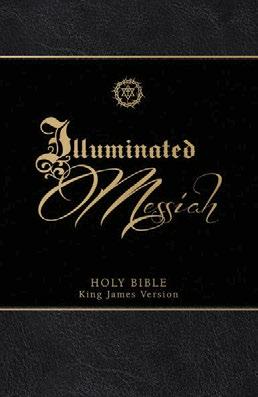

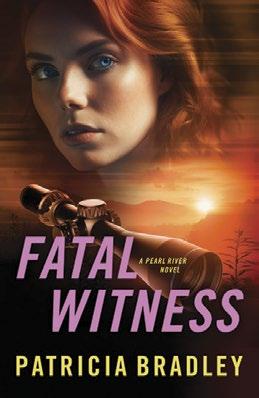
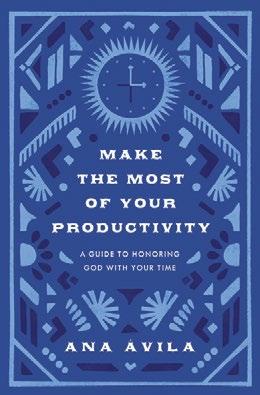
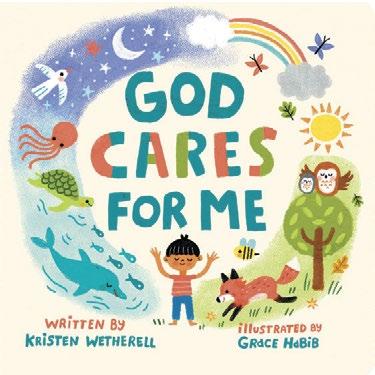

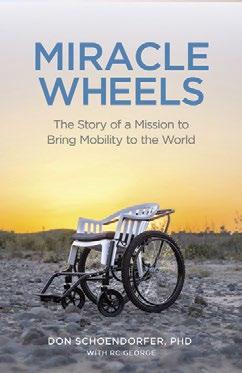
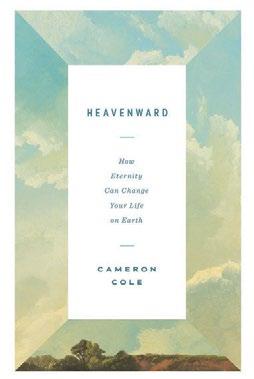

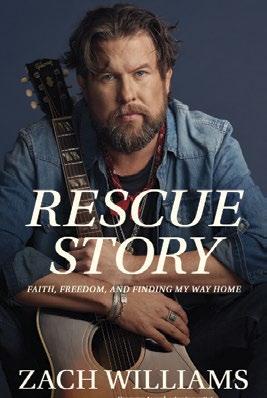
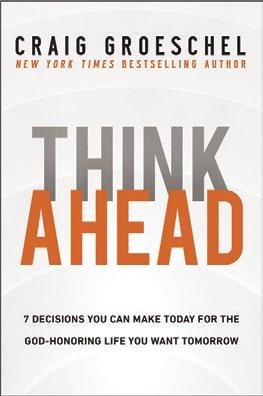
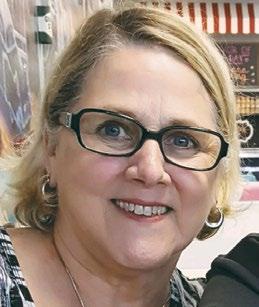 Sandy Hope Stewart
Sandy Hope Stewart
lives with her husband of 51 years in Virginia Beach, Virginia. She has written a memoir, From the Homefront: Memoirs of a Military Spouse, about the trials and victories of life as a military spouse and God’s faithfulness throughout. Her husband, three children and nine grandchildren are her heart.
By Sandy Hope StewartThe first time he left me I was devastated. He told me he couldn’t be with me anymore. He was done. And even worse, he took our six-month old baby with him. I was in a full-blown panic as I raced out the door to stop him. I got to them as they were boarding the helicopter. Just in time to watch it rise straight up and disappear from sight in seconds.
This was the first time I dreamed about helicopters. It would not be the last. About two years after the dream – nightmare, actually — my husband joined the Army National Guard. Both of his Vietnam tours left him with the desire to get back up in the air. He had not yet shared any details of his war experiences with me. If he had, I would have been less enthusiastic about the whole thing. All I knew about helicopters was this; they sometimes take husbands and babies away from wives and mommies, at least in dreams. But at the time, we were both thinking about the much-needed extra income it would add to our sparse bank account.
Several years later, my husband became a sailor in the United States Navy. I began having recurring dreams of him leaving on helicopters. The scenario would change a bit but the gist was always the same. He was away. It was impossible to communicate with him. I had no idea if, or when, he would be back. Often the dream included the fact that he didn’t really care.
As if the rest of the dream wasn’t stressful enough, the last part left me feeling totally abandoned. Just like the very first dream/nightmare. I was always relieved to wake up and understand this was not my reality. Except it kinda was. Not the part about him not caring. But the rest of it did happen.
He did go away in helicopters. It was impossible to communicate with him. I did have no idea when he would be back. And, at times, whether he would be back. Helicopters sometimes take husbands away from wives and babies in real life. I hadn’t realized the recurring dream had become a thing of the past until it popped up again many years later. Why, after all these years post-retirement, would it return?
It occurred to me that the reason for the return had morphed into my new reality. The dream now includes the fact that even though he is retired from the military, my husband has been called back for a secret mission. I truly believe my subconscious is now coming to terms with our mortality. Our aging. The realization that, most likely, one of us will leave this earth before the other. Now when I wake from such a dream, I place my hand on his back or watch his chest to be sure he is still breathing. I suspect most other older folks do this too. I am not obsessed with death, his or mine. But those pesky dreams! They are proof it’s in my subconscious mind. A lot!
We are in our 70’s now. Even if we have another twenty years left on this side of heaven, we are in the final season – the winter of our lives. When we get together with friends our age, our conversations sometimes include the woes of aging. We laugh about some of it, but serious conversations take place as well. Some of our friends are dying, while some are left as widows or widowers. And this will continue and eventually become the norm. It’s important to have friends to talk about aging with because it is impossible for our children to understand. It is unfair to expect it of them. It helps us to come to terms with it.
As Christians, we encourage each other in the knowledge that, as we face the end of life in this realm, we joyfully anticipate the glory that awaits us. Will my husband continue to leave me? Perhaps! While he will never go away in service to his country again, he may do so in my dreams. And yes, he may leave to continue his eternal life before I do. If or when that should happen, God will send the grace I need in abundance, exactly when I need it. Just as He has every time I have needed it thus far, no matter what I dream.
And He has said to me, “My grace is sufficient for you, for power is perfected in weakness.”
Most gladly, therefore, I will rather boast about my weaknesses, so that the power of Christ may dwell in me.
— 2 Corinthians 12:9
